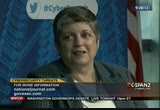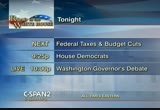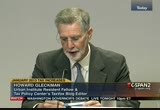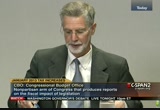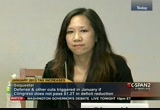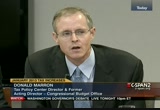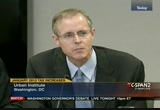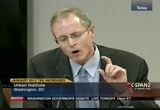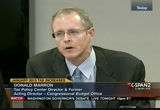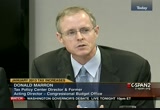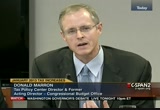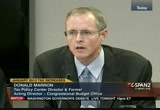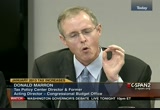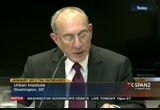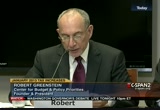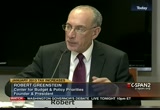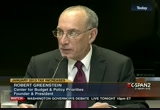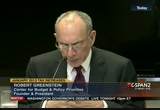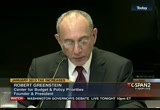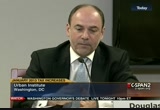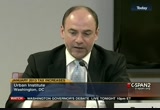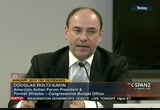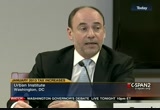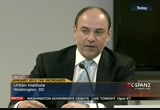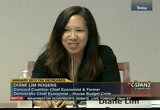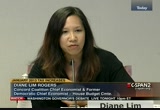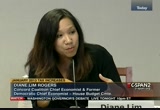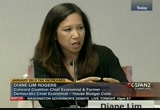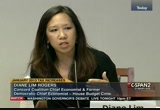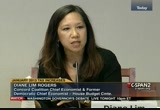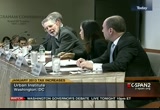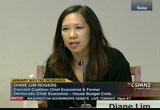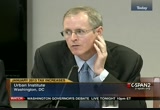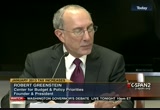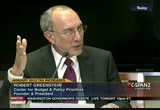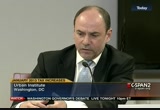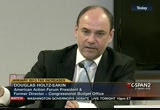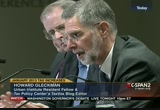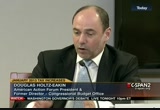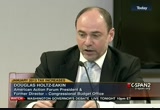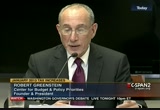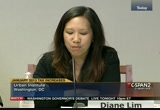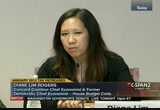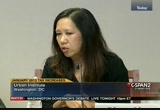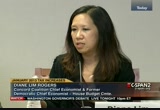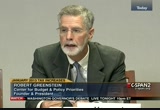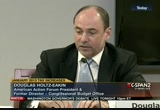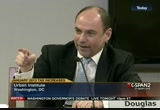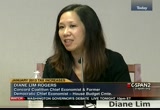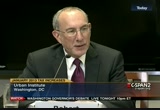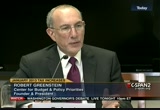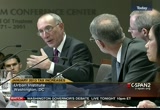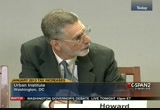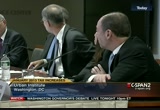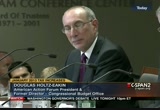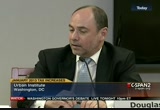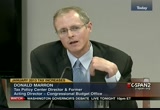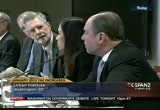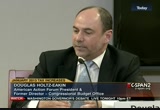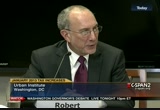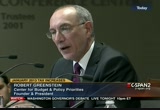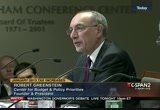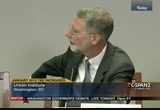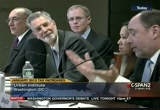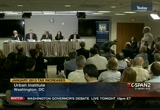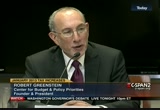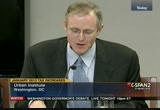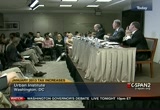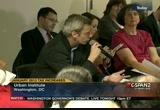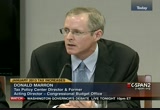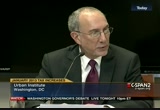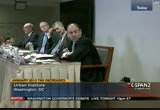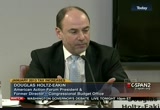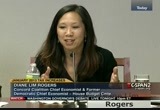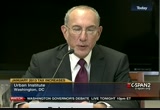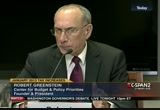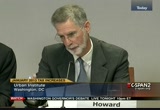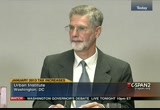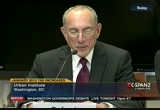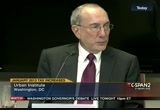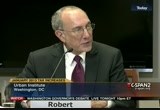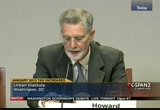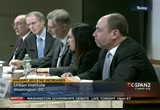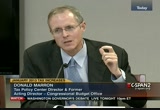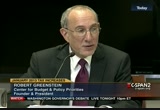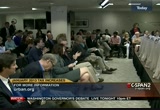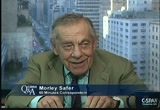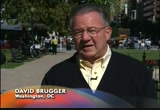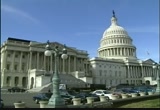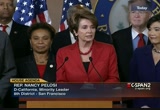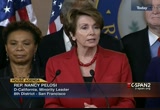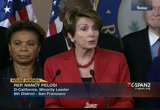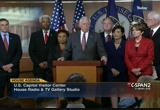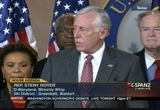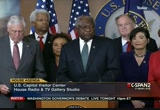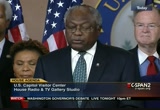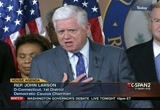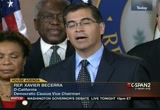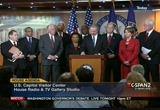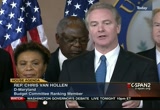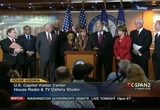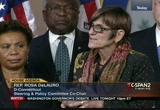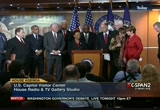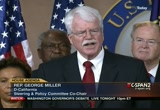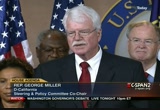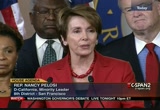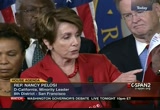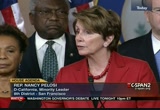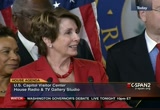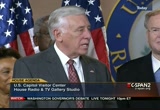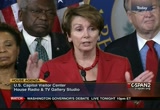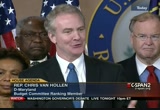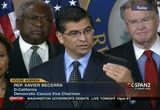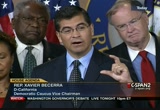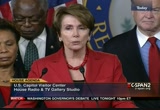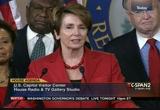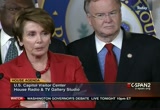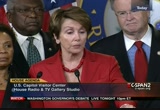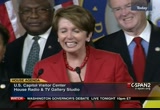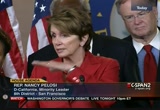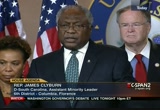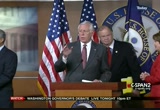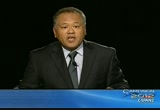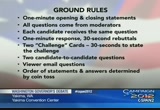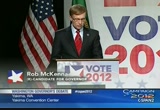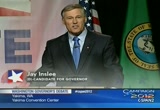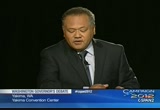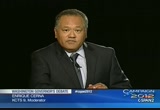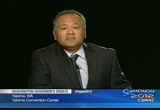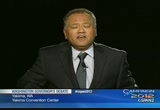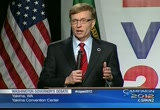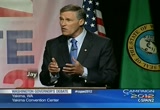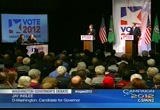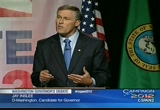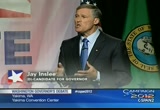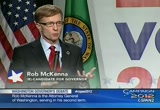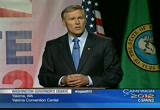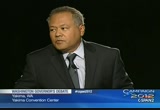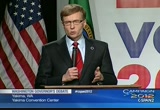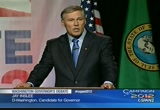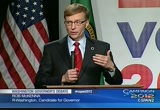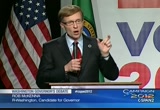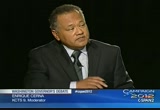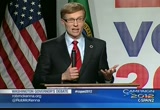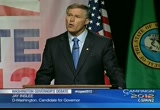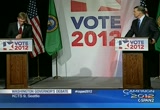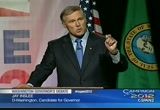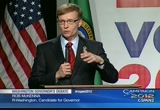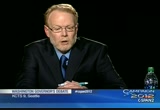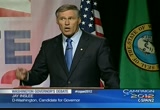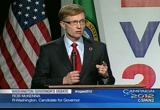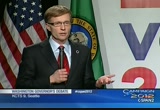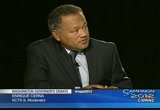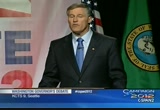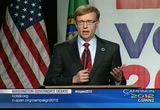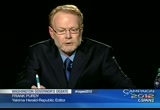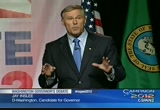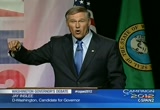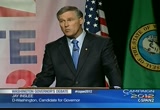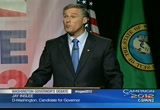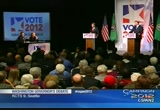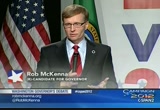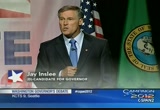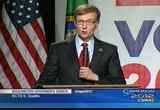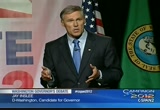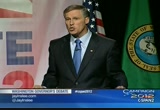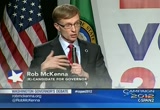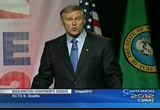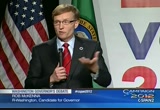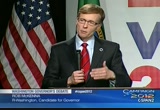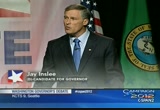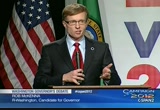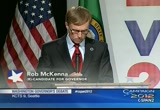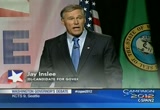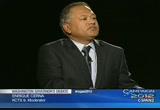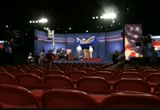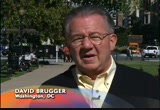tv Tonight From Washington CSPAN October 2, 2012 8:00pm-11:00pm EDT
8:00 pm
8:01 pm
family pays $2,000 more in taxes next year if the fiscal cliff happens in january when the payroll tax holiday ends. economists discussed the issue today at the urban institute. this is an hour and a half. [inaudible conversations] i think we are ready to get started, everybody. [inaudible conversations] good afternoon. welcome to the urban institute's first tuesday. i'm editor of the tax blog, tax blocks, and we're here to discuss taxes and the fiscal cliff. washington lives in sue perlatives. everything that happens here is the biggest, the worst, or the most important. how many times, for instance, have you been told that some politician is about to give the speech of his life until he gives the next speech? the taxmeggedon has the
8:02 pm
potential to be a watershed in fiscal policy. it's true. it could be another way to kick the can down the road, but it could be a tipping point to end a decade of fiscal gridlock. yesterday, the tax policy center released a new study on the cliff, and we'll talk in details, but to summarize, it found tax increases due to occur at the end of 2012, if they last for all of 2013, would raise taxes by $500 billion. the average household would pay $3500 more if this year's rules are in place. cbo says these tax hikes and hundredings of billions of dollars in discretionary spending cuts drives the economy back in recession and cost 2 million jobs. on the other hand, it also goes a long way in reducing the budget deficit. even by washington standards, that all seems important.
8:03 pm
to discuss the cliff and the consequences, we have a panel of four budget watchers. bob greenstein is head of the president obama's transition policy work. doug holz-eakin, president of the action forum, headed the staff, directer of the congressional budget office. he was a member of the president bush's economic adviser and was an acting directer of cbo. finally, diane lim rogers blog z as economist mom and was chief economist for the house committee and the ways and means committee. our format today will be relatively straightforward. each speaks for five minutes, and i'll ask questions, we'll l get a discussion going here and turn it over to the audience to give you a chance to ask the
8:04 pm
questions. we've people watching on c-span and the web, and if you're not in the room, send them to publicaffairs@urban.org, and those questions will come to me. to start, donald? >> thanks. thanks, everybody, for being here and braving the rain to talk fiscal cliffs. i'll try not to ruin your lunch. as howard mentioned, we put out a big report yesterday about the tax components of the fiscal cliff, walking through the details and potential effects on american households. today, in the quick remarks, five points we raised in the study. the first, and howard took some of my talking appointments here, is that the fiscal cliff is big from a tax point of view. if we go off the cliff and remain this for all of 2013, it would be more than a $500 million tax increase. if you think about federal tax revenues running in the neighborhood of $2.5 trillion,
8:05 pm
that's a tax increase of more than 20%. that's very large. we are media ask if there's the largest tax increase in history, and as best wz can tell is no. back in world world war ii, thes a larger increase, but 20% is big. on average across american households, that's $3500, and if you look at a tax, a family in the middle of the income distribution, the middle, earning $50,000, that's in the neighborhood of $2,000. it's a significant increase if we go off the cliff. second point is that it affects everybody. we looked at the model, ran through the tax changes that are going to happen, and close to 90% of households will see taxes go up as a result of going off the cliff, okay? basically, that involved almost everybody. there's folks out there, primarily older senior citizens who don't have the income, don't
8:06 pm
have children who might be unaffected, but the vast majority of american households, they would be affected going over the cliff. obviously, the immacs on the families varies by income levels. first order of business for us it is run through the model of the u.s. tax system, what the effects would be for folks, households of different income levels, see what happens to the tax rates, and those in the room today have a handout that summarizes the results we have. those at home and work should be able to find the full study on our website, taxpolicycenter.org, and what you see is for a typical middle class house hole, it's an increase of $2,000. that's the neighborhood of a four percentage point increase in the tax rates, roughly the same increase in tax rates for people at other income levels. if you look for people at the lowest income levels and median income levels, a four point
8:07 pm
raise in the tax rates. dollar amounts varies for folks in the lowest, it's $400. the one really strong noticeable difference is the high end of the income distribution. people up in the top 1% of the income distribution, their tax rate goes up 7%, and that works out to $120,000. obviously, the large amount of money at stake is because folks in the top 1% earn a large amount of money, and the reason why the largest tax increase and percentage terms is up there comes to be from the various component of the cliff focused at that level, the high end tax cuts, originally acted in 2001 and 2003, and along with the start of the new taxes that are associated with the health reform act, okay? it's big. affects almost everybody in america. it varies by income level. now, if you think about the components of the cliff, right, we've been in america debating
8:08 pm
temporary tax cuts for a dozen years, like all the way back to 2001. over that time, we've accumulated a snowball, a gigantic list of things that expire at the end of the year, and new taxes have come on line. in rough orders of the magnitude, the tax cuts enacted in 2001 and 2003 are half of the story now, and so you should not view the debate over the fiscal cliff as just being a debate over the bush era tax cuts. in the intervening dozen years, there's a series of patches to the alternative minimum tax, preventing many families from falling into what is for many a surprise second tax system. if we go off the cliff, about $20 million more american families end up on the amt. there's an ever-growing list of tax cuts, mostly for businesses, some for individuals that have been active a year or two at a time that have now been known as the extenders. i refer to them as the expirers since they are scheduled to
8:09 pm
expire, but in washington where the usual anticipated outcome is they get extended, they are called the extenders. there are several dozen of those. there's the estate tax, which changes were originally part of 2001 and 2003, but in 2010, there was a revised version. that expires at the end of the year. let's see if i get through all components. state extenders, and 2342009 after president obama took office, the stimulus act included credits focused on low income families and families with kids in college. those were extended in 2010 and expire at the end of the year. there's the temporary cut in social security payroll taxes that was done as stimulus for 2011 and extended for 2012. in addition to all of those expiring tax provisions that got most of the attention from a fiscal ma crow economic point of view, something else we have are the beginning of the tax increases included in the 2010 health reform act.
8:10 pm
when you look at the debate over the fiscal cliff, the point here is to recognize there's actually a very diverse array of tax provisions under discussion, and that's important both for understanding the effects on american households, different households affected differently by the provisions, and at the low end, for example, the credits that were enacted in 2009 turned out to be very important as does the temporary cut in payroll taxes, temporary cut in payroll taxes continues to be important for folks in the middle range of income. at that point, the 2001-2003 tax cuts are important. if you go to the high end of the income distribution, in addition to the 2001-2003 tax cuts that affected high income folks on ordinary income and investment income, there's also the start of the health reform taxes that loom important. depending on what slice of the income distribution you look at, different components of the fiscal cliff are particularly important, and then, also, just keep in mind 245 -- that the politics and political
8:11 pm
futures differs. while the numbers are about the fiscal cliff as a whole, it's important to recognize things like the social security payroll tax cut were intended as being temporary. the debate about those are primarily about when they go away, not weather. other things in the cliff are things that have been the topic of ongoing don'ts about whether they should or should not be permanent features of the tax code. figure out between the ones that will go away, those debated, and those who seem unlikely wanting to end like the amt patch. final point, you know, if you think about the challenges faced in the tax system, and i could filibuster ewe to beth with all the things wrong with the tax system, but the most policy as a policy matter has economic consequences, but primarily troubling is how much uncertainty there is on what on earth the tax code is.
8:12 pm
it's a reminder how severe that is, that at this point, we have significant individual income tax, corporate income tax, estate tax, and others that end at the end of the year. we don't know what code is anymore. it would be nice when we emerge on the far side of the cliff, if the leaders in congress and whoever the president turns out to be can get us to a situation where we know what the tax code is. >> well, thank you. next speaker is bob greenstein. >> thanks. i think as we all though, there's two risks here. there's the obvious risk to the economy in the short term. cbo said that if we go over the cliff, and all of this $500 billion and all of this comes out, all the aggregate demands is from the economy, we'll have a mild recession, but a recession in the first part of 2013 that we would be back in recovery by the second half of the 2013, but a recession on top of where we are already would
8:13 pm
not be good, but the bigger risk, i think, is the risk to the economy in the long term if we keep kicking the can down the road and do absolutely nothing about the fiscal problems. how do we think about these two things? there's an interesting report several months ago from the carlisle group, and i just want to briefly read what it concluded. it said, "virtually every analysts' preferred outcome is a grand outcome that preplaces the crypt with an alternative phasing in the deficit reduction over a period of years, but should a negotiated settlement fail to materialize during the lame duck, the most likely alternative might be a simple extension of current fiscal policy. while such an expension improves the near term growth prospects, it relieves the pressure, but substantially hurts the longer
8:14 pm
term outlook. it might be the expiration of current fiscal policies to create real pressure for both parties to wok together and reach a grand bargain." mark zandy of analytics wrote the same thing. i'm with carlisle and moody. we want an outcome in the lame duck, but if we can't get it, going into january is less bad than extending everything and doing nothing. there's a few key points to understand here. what did cbo say? they did not say we go into recession on january 2nd. donald mentioned the figure of, i think it was $500 billion. the $500 billion comes out of the course of 12 months, not the first week in january. what cbo basically said was if the tax cuts expire and stay expire, if sequestering goes into effect and stays in effect, we're going to go into a recession.
8:15 pm
it's really from an economic standpoint a slope rather than a cliff. if it's a cliff, wiley coyote style, you go over the edge, and you're dead immediately. the economy is not dead immediately over january 2nd, but the further you go and the more demand that comes out, the bigger you're problem is. here's the key. look, the key is we need -- the only reason there's a fiscal cliff in the first place is the political impasse. you can spread blame around, and both parties have to move, but let's face it, in the negotiations over the past year, the single, not the only, but the single biggest obstacle has been republican unwillingness to move significantly on taxes. if they will move on taxes, i think democrats, the number of them including the president, moves significantly on spending, and we can have a frame work agreement in the lame duck. if there's not movement in the lame duck, i think we go into
8:16 pm
january. what happens if we do? think of 1995. we had a government shut down. newt gingrich i clinton. once the government shut down, the pressure on both sides was so intense there was a deal in less than three weeks. the pressure, if we go into january, will be far greater than it was then because the economic consequences and the market consequences are more significant. i think it's inconceivable that if we go into january, there won't be a settlement in january, early february at the latest. we hit the debt ceiling in february anyway. there has to be a settlement. somebody has to blink, probably both sides blink to some degree. i've talked a little bit to people in financial markets in new york about how they think the markets would react to all of this. the reaction i've got is there's a lot of nervousness, a lot of
8:17 pm
volatility in the markets in january. if there is a deal in a few weeks, and any deal clearly makes retroactive to january 1st, the tax cuts continued, and we'll remove sequesteration, then what i'm told is in the interim the damage really won't be that significant. now, for fiscal hawks, many of us have been saying for years when do we get action? maybe only when the markets put intense pressure on. in it happens in december, that's better. 23 it happen -- if it happens in jap, that at least could be significant progress. i'm just going to end kind of where i was near the beginning referring because i think they said it very succinctly, carlisle, mark zandy wrote ideally they navigate around the cliff without undermining the
8:18 pm
economy and making changes to lead to stainability. such fiscal anywhere van that is not achievable in the lame duck, but it will be early next year. the coming tax increases probably will be a bit to generate the necessary consensus between the two political parties. i hope that is not right, but if it is, that's what we need to do. thanks. >> doug, i assume you agree with everything bob said? [laughter] >> so bob is right you have to sort through the issues, and he's come to the wrong bottom line. first, on the cliff, itself, this is an extreme danger to the economy. everybody has numbers. you put together the tax increases, spending cuts, it's like $640 billion in the calculation, 4% of gdp. we're growing at 1.5% at best.
8:19 pm
you hit that growth rate with a 4% gdp shock, you don't have to be a genius to figure out consequences. we have a recession more severe than what the cbo says. that assumes it happens in january. it's actually happening now. we are already seeing implications of the fiscal cliff affect the economy. there's been antedoal reports of businesses talking about this coming, looking at the weaker economy, scaling back their plans. we've got the requirement that defense contractors have to send out notices to employees who will be laid off. they are already talking about whether they are getting nervous. if you're a dividend investor looking at the tax rate from 15% to 45%, january 1, with probability, you're worried about being in the market. this is not something that's going to wait until january.
8:20 pm
it's already harming the economy, and if we go over the cliff, it would be irresponsible in the extreme. the entire issue with the fiscal cliff is to get from here to the spring of 2013, being good stewards of the economy, and not cause a recession. that should be the goal. if you look at the pieces of the cliff, the payroll tax cut, the temporary holiday, there is a pretty much bipartisan consensus that's going away. there's some tax increases there. considered inconceivable we get rid of the taxes of the affordable care act from now until january 1, that's another increase for sure. that places a real premium on avoiding the rest of the tax hikes and spending cuts, and so i think the sensible thing to do is say to congress, you know something? your strongest instinct is to
8:21 pm
kick the can down the road. do that, extend the current tax rates for another year, don't get the recession, and then when it comes to cuts across the board, that's horrifically bad policy. it was intended to be such bad policy that congress would do something sense l. we underestimated what it takes for congress to do something sensible. that has to be got ming rid of -- that has to be gotten rid of it. it's bad for the defense posture, does horrific things to domestic programs. we have to replace that with a longer range cuts that get the same amount of reduction sending the message we are serious about retaining the deficit reduction we got. that's the hardest thing to get down in the lame duck. they should just do that. just remember there are really three different problems. problem one is the fiscal cliff rvetion -- right? problem two is the debt limit
8:22 pm
increase that would come early next year and pushed maybe as late as march. problem three is the big problem. the problem is our fiscal path is unsustainable, dangerous to america, it is the single greatest threat facing our economy. we shouldn't conflate those. we can -- we want to temporarily get past the fiscal cliff, push the debt ceiling out temporarily, and clear the debts to deal with the problem. the question that comes up all the time is, well, if you do that, kicking the can down the road, will they deal with the problem? the answer, to me, has to be yes. rating agency, one downgraded the united states. it's inconceivable to me, at least, if we say august or perhaps a full 2013 and in the honeymoon period of the new administration, don't make real progress on the problems, that the rating agencies say, yeah, we're right, even in the best climate, new congress,
8:23 pm
everybody's being nice, they can't make progress, the poll sicks are so toxic they will not deal with the projects and downgrade us. we have to move in 2013 no matter what. you don't need recessions force us to move. it's irresponsible to have a recession. get past the cliff, extend the debt ceiling, and get to the fundamentals in the bargain that get rid of cliffs, we'll have a tax code, get rid of sequesters because we know what the spending plan will be. that's the best way to go. >> diane? >> so the way we got here, to the fiscal cliff, was a bunch of cans kept getting kicked down the road, and they all happened to land right in front of us now at the end of december. if you look at cbo's analysis of the fiscal cliff, you realize the scary part is the pile cans at the end of the road in front
8:24 pm
of us right now. there's a good part of the cliff, though, and that's the part that stretches on in the the rest of the ten year budget win doe, and, ofng, on to something we call the current law baseline, and cbo analyzes that. cbo talked about how going over the fiscal cliff at the end of this year would bring us back -- likely bring us back into recession, but they also talked about how the fiscal cliff later in the ten year window would cause higher economic growth. i think that's very important to hold on to because we have been in the habit of kicking the fiscal can down the road. they all happen to land in front of us, and i'm here today to say we shouldn't just kick the can down the road again. we shouldn't even try to substitute the fiscal can with the grand bargain like simpson-bowles simply because it is too hard for us. i know we can't do that. i'm proposing instead of, and
8:25 pm
i'm proposing, not congress, i'm proposing that instead of substituting the fiscal cliff or ignoring it, that we recycle those fiscal cans. we can't kick it, but we have to recycle it. there's the notion, all the fiscal cans representing certain policies that we were willing to commit to in the past that legislators past, committing to the tax bush cuts expiring at the end of 2010 and 2012. they chose to kick the cans to the points in times comprise of those those elements. there's a lot of good substance to essential elements that make up the cans. let's hold on to the cans, not just kick them. let's not just ignore them. let's keep them, and here's what i mean.
8:26 pm
recycle them. look at the composition of the cans in terms of how much is revenue increases and how much are spending cuts? they are doable and easy to do over the ten-year window. hard to do now. the pile of cans as it stands is not useful to us, but harmful to us. let's take the cans along and progress by committing to using those cans along the way over the next ten years to put in place policy that uses every bit of the elements of those cans so if the cans says tax increase, we're going to come up and use that for a tax increase. if it says spending cuts or discretionary against mandatory cuts, we'll use it for that purpose. doing this is a way of achieving, sticking to the current law baseline paths of revenue and spending, not
8:27 pm
necessarily in the exact timing or form that the current law baseline looks right now, but sticking with the essential elements. those of you who know me know that i have the current law baseline, i'm fond of it. in the past, i said what we need to do is follow strict pay as you go. tired of exempting that, ignoring that. stick to pay as you go. the next time we kick the can down the road, commit to pay go and no exceptions. i'm just going to modify that today. instead of pay go, it's recycle as you go. use every bit of the essential elements, but keep moving forward. set targets, set targets you'll achieve that congress will by x date use xy percent of the can that we've kicked down the road. in terms of achieving the same
8:28 pm
amount of deficit reduction in the ten year window. use the budget committee and process to enforce this. reconconciliation, budget committees actually direct the tax writing committees and other committees of jurisdictions in the programs to come up with reforms that achieve certain spending or revenue targets. the tpc's analysis is the kind of analysis we need to be able to lee cycle as we go. it's the analysis we need because it tells us something about what it can look like in its present form. do we want to use the can like this or melt down and reshape it and use it for different parts of the whole system? we're going to need more analysis. we need more analysis about not just the distribution effects, but the tradeoffs. for example, if we want to keep tax cuts low, we have to broaden the base, what are different tradeoffs to lower the rates by 10%. how much do i broaden the base? what are the most progressive
8:29 pm
elements of that? tax policy incentives are busy in the next year is what i predict, and i think that what we need to do is keep asking ourselves the question as we go along the way. are we using all of these pieces of fiscal policy to the best ability and to their best purpose, and ideally, we come out at the end of the ten year budget window, you know, driving a really great fiscal machine rather than just being stuck with a pile of junky cans. >> okay. thanks. now that we have consensus -- [laughter] diane, asking you first is it unfair of me to be cynical about budget process at this point? especially after -- >> no. >> as doug suggested the sequester somehow went away. how do you do that and get the
8:30 pm
guys to do budget process that they mean, anybody believes that they really mean? >> well, it's a conquered coalition, the way we view this is you have to create a lot of public sentiment for this kind of discipline. you have to make it clear to the public that this is noting? that we can -- this is not something that we can sit around quietly and hope for. you have every right to be cynical about my on the mistake view, and yet i think that it is hard to do good tax reform. it is time consuming. it is hard to do entitlement reform. we don't want to rush into anything, and, yet, we have to create boundaries because what has been happening for the past decade or over a decade has been that deficit financing is the easiest thing to do. it seems free to people, and i think until we hold congress to budget constraints and until the american people hold congress to
8:31 pm
the budget constraints that are necessary, we're not going to make progress. .. >> well, it's fun to talk the grand bargain. it's fun to gather people with good intent around the table and good details. there are various levels and details. it remains a little difficult for me to believe that congress is ready to get their, or
8:32 pm
frankly the american people are ready to get there yet. as with the role of government is and how big it should be. they need to strike a responsibility comments hurts to see how you get to the grand bargain and address the entitlement tax reform. >> do you think there's a possibility of a grand bargain >> is a possibility of a two-stage bargain, so stage one is probably january and december. you have what is called a down payment. you act entitlement and the two parties have to agree dollar amount in those areas are going to reduce detailed legislation, presumably on the same time and
8:33 pm
here's the hard part, you have to see some kind of enforcement mechanism and in case were kind of back where he came from. so that is really the hard part to do. and i'm not overly sanguine about it, but the chances of pulling up back if you're parallel is some, significant numbers of both the entitlement revenue side, they move in the same timeframe and are linked together. so republicans don't get the savings without swallowing significant revenue increases in revenue and creases without swallowing spending changes, which is by the way one of several things that is upside down. look at that proposal. of the tax cuts gave extended, the spending cuts all happen now with sequestration and spending
8:34 pm
cuts, even though cbo believed to other analysts, saying that debate for the buck in terms of the economy for the high-end tax cuts because a lot of them are saved with the media spending cuts is higher. so that also wouldn't make a sons, but my larger point is you must have parallel is a an linkage from the tax and spending changes or we're not going anywhere. >> do want to respond? >> i think you need to be careful about what kind of expert patients. the big difference across the table is not whether we need a big deal. we do. i believe amid a large shield for the reasons i said earlier that we are out of time. international capital markets in
8:35 pm
general. and i big deal will include tax reform and entitlement reforms because republicans are not going to touch the tax reforms. democrats are reversed. so we know at the shape of that looks like. you're not going to get that done. first of all, lame ducks are short and there's not enough time to figure out where you're going to be. that's a problem. second problem with the lame-duck is if you're trying to settle the long run tax structure and the long run nature of our entitlement safety net, whoever has been advantaged by the november elections is going to say, let's wait until spring when i geyser in the sea, so the incentives are all wrong. it says let's do it next spring. the third thing is certain that lame-duck there holding a leadership objection. you will see people say vote for
8:36 pm
me, but to have a big compromise. it is a terrible environment for the deal that needs to get done. acknowledge the reality, but let's not cause a reception country in recession. they'll get the 2013 intact. >> or may get your reaction. as long as the discussion about tax reform is an ongoing argument about the bush tax cut -- >> i'm so sick of bush tax cuts i can hardly stand it. >> that's exactly the point. the point is his honesty of extended, and as arnold said in the public discussion is the bush tax cut. so as long as you extend them, can you get out of that conversely, does that change the
8:37 pm
framing of this there were no longer talking about bush tax cuts come or second that the tax code? at the tax code is a working melissa joan c., rather than forget the tax code. >> at 100% agree we should talk about the tax code. we should lower the tax code is no should be something we actually believe in. that's long overdue. it's just dangerous to let it all go at the end of the year. let's face it, if we have a recession, we are so irresponsible, we're not going to do any deficit reduction in a recession. i'm not going to fix any of these problems. the congress is simply not capable of the recession is talking about raising taxes, cutting spending. it's the run environment, so it's dangerous to be the risk that. so there are ways to do with this. if we did it in regular order the processes, house for example passes a bill that extends the tax cuts for a year and pairs
8:38 pm
with the fast-track legislation and replaces the discretionary cuts with a longer-term reduction. so be nice to see the senate, for some thing or go to congress and hammer this out. that's the way to do this. the tax reform, as i mentioned is really hard. i'm a very third of next year, the 16th amendment -- as neighbors day, by the way, the 16th amendment will be 100 years old. so her income taxes 100 years old. in those 100 years, we have had less than a handful of comprehensive reforms. so the notion that we are going to do that than nothing that is going to be hrd to do to begin with. so i think we have to acknowledge that is going to be hard to do to begin with. so i think we have to acknowledge that is going to be hard to do to begin with. so i think we have to acknowledge that extend current policy, get it done in 2013. it is part of what is necessary for us to try economically in
8:39 pm
the long-term. >> doug is really backing down. in no way were suggesting in january we are rewriting all tax code. it is freeware legislation at that point. that is where the bill house passes you referred to. that's really a joke. it extends the income. we have a weak economy. it lets the tax cuts for all working families expire. that will produce a string to increase aggregate demand and a weak economy, why would you like the ones that have the highest bang for the buck expire? fundamentally there is another issue. as i said, you don't co-opt the class into a reception. that is more like a cliff, given the permanent damage if you do to the u.s. credit worthiness.
8:40 pm
so the analog should have done that in august when reproaching the data format, the parallel argument about the economy would have been a one-year extension. now, that wasn't on the table because the debt limit was a mechanism to draw us in a test of the revenue. now the shoe is on the other foot there's a risk to the upper-income tax cuts, all of a sudden the economy is in terrible danger. there is a little bit of lack of parallelism between the approach to the debt limit, which really was in the approach the upper-income tax cuts. >> diane, does there have to be this parallelism? >> as i mentioned, i i think the mix of revenue increases in spending cuts in the class or the tenure when does is about to
8:41 pm
break. obviously that means i favor of revenue approach and i think it's not really quite here either. 98% i think of the one-year fiscal cliff is revenue increase, said the spending cut are all fractions of the size of the one-year class. i think a balanced approach is necessary in order to get bipartisan cooperation. but i think the wish to enforce that could be by specifying an coming to agreement about the basic parameters for revenue increase versus how much comes from spending cuts. i don't necessarily think that substituting current law with something like simpson/bowles is
8:42 pm
the way to go simply because it's not just a mix that spending cuts and revenue in creases in the particular form of the reform. it's a maximum tax rate and make certain assumptions about how successful we will be, which i don't believe will come true. and it doesn't respond -- simpson/bowles doesn't respond to the changing condition of the economy year after year. they think so endeavor cycling the approach i was talking about, what i have in mind is you take it one step at a time and you adjust it, make commitments to a certain amount of deficit reduction, the tailor the policy better to denny's at the time. for example, pick up a can that has revenue and greece is supposed to take place over the next 10 years and you pick it up and look at them and say, does this really make sense right now given we are still recovering from the recession?
8:43 pm
is this too regressive? can we find a different form to do a less harmful form of revenue and praise, even right away then monday may be low-income tax cuts. so i think remixes not so hard to come up with. i think i have not yet seen a package that is realistically acceptable to both democrats and republicans in terms of actual policy. in this surprising because i was but even like tax reform component, you think the republicans are in favor of reducing entitlement spend and peer democrats are in favor of raising revenue approaches, but she be surprised how many democrats don't really like the details revenue raising approaches and how many republicans don't like the details of spending cuts. so i think were very far away
8:44 pm
from the idealistic version of simpson/bowles, which i love, but i just don't think that we're anywhere close to realizing the next that the mets plan. we are very far away from that and actually getting to what you may manage in the next year. >> it's an interesting point. watching the presidential election, where neither candidate wants to talk about the specifics, get even closer talking specifics. you even have a case where the obama administration slowed the growth of medicare spending by $700 billion the big attack of republicans for having done not. in the environment where you can't talk about medicare, where no one would talk about --
8:45 pm
everyone is just talking about loophole closes, how do you get from here to there? let me ask doug first. you save the environment would be different in 2013. other than this pressure you talk about for the rating agencies, what is going to get these guys singing to my all? >> they are not going to think oh my god. this environment is the worst, but this'll be the right time to fix it. you don't have to worry about economics not happening. it can be the second word and it's very unlikely that she can't avoid getting it to next year, where i think they're going to be outside pressures. capital market, cutting rating agencies and great leadership out of the white house to get this done.
8:46 pm
and it's going to be difficult underscored to be lots of days where it's going to look like were going to make it and there's no question about that. we are never very pretty when we solve the problems. next year is the time to do it. it does need to be done. there's no question about it. you're not going to design the big issues and things like that in the lame duck. you're just not. you have to wait till next year. >> for me ask you, what signal would you like to see from the presidential candidates to move this process along? would you like to hear them say either tomorrow night over the next five weeks? >> i would think the same price in the united states to say we, meaning the white house, the senate and house have a problem in the fiscal cliff, but we should solve, that they have a problem and point fingers. this is a big deal but very dangerous to the economy. and mitt romney, the challenger
8:47 pm
is this an intimacy where he gets a vote, but he should be highlighting the importance of getting here to the spring. once you get to spring coming out to do some pain. you do have to commit to the two things that we don't like bush is raising taxes and cutting spending. >> i totally agree with that. i think we need to hear from the candidates that they are serious about getting deficits down to economical sustainable levels over the next 10 years and that they will not a short-term fiscal cliff for the economy, but that isn't another version of benjy saying we're going to kick the can down the road again. i would also like to position to be that we revert to what we sat in current law. i would like that to be the default, rather than the default to be business as usual. i would like them to stick to current law.
8:48 pm
[inaudible] >> if you think about the way policy is made for the last two years convoyed really fallen into a horrible pattern of only making decisions on if it's a crisis. government shutdown command defaults or whatever would've happened. the super committee last year would've attempted a faux crisis of having a process in place when there actually was in pain associated with the super committee process in so nothing happened. now we have a fiscal cliff, which is the next crisis and aspiration will force action. they think it will be nice to see our leaders, including who is president to switch back to the model on which post is made to leadership rather than just responding to the crisis. >> i somewhat disagree with some of the other answers in this sense that -- well, i think both candidates are doing lots of rhetoric on this and this is a really serious problem we have to address. the criticism on the romney side
8:49 pm
is the lack of specifics. now i don't intend that as a partisan comment. if you're sitting president, have to submit a detailed budget so obama has a detailed budget to dbo scored is producing about 2.4 trillion deficit reduction over 10 years. and if you have that loves already accomplished, you're at about 4 trillion you can argue whether it's enough for not depending whether you reduce the debt to gdp ratio. a perversely, i am not actually sure that i would want to see romney detail all the expenditure changes he would ultimately come up with. the problem of course is that in campaigns, people start putting out more details and proposals come you mobilize the opposition. there are some things about the tax and entitlement area that i've comically discount like the nativity three social security commission are better achieve if
8:50 pm
the two parties can hold hands and they don't start out and obama proposal for democratic proposal a republican proposal. i am less interested in exactly what he said in the debates in the next four weeks then what whoever wins said in a week or two after the election. to me that is the time to step up into the broader leadership. a >> apology like to hear president obama say either before or after the election? >> if your view is that finance, that we are not going to have a deal that doesn't have revenues and spending and that's the biggest obstacle is on the revenue side and that is i do believe i have asked a lot of democratic senators and they say yes, that is that republicans continue to believe that at the end of the day in the 11th hour democrats as they did in 2011 at the end of 2010.
8:51 pm
frankly one of the things the president has to do is to make it crystal clear that he is serious than he is going to accept a deal that doesn't have both revenues and spending. lustrous way that out. i think when that becomes successful, that is my fear of going to january. we may have to go into january because republicans won't believe it until we get to january. the sooner that is believed, that lays the predicate for both sides living together bipartisan leave. >> i want to follow up on a question or an issue that agrees. on a panel with a group of economists i think it's a good opportunity about the behavioral response to the looming fiscal cliff. doug, you suggested we are already starting to see some response. >> the notion provides on the fact that everyone is incredibly myopic and they wait to january to see an impact and the impact
8:52 pm
that have been w. andersen leaked anonymous amount of voters and anticipate things. they're anticipating now and will anticipate even worse if congress fails to make a deal. and i think that is really, really important. you have to acknowledge that and thinking about how you address this problem. for the same reason, they are out of time to get the big deal next year because we've all seen this movie before. if the newly elected president in the presence of clear danger to the economy get congress to fix it, they're going to expect we will never fix it. and bad things will happen. >> at the stock market is booming. >> i think doug is confirming my point, even though he says he's just been met, the point about the slow. we were in the very, very, very, very early stages of the slope right now.
8:53 pm
so if you're an agency of the federal government and look at potential for sequestration, you think many agency heads are not spending at the full quarterly rate in october, november, december. you are going to be able to be cautious about some of those new contractor things if you're worried there's going to be a percentage reduction in january. so i think it really is the slope and it is in a slope that starts january 1st. there's very, very, very beginning pieces of it now. it isn't like the world changes over night at midnight on december 31st. there's no question because at that point you will have definitively proved he didn't get a deal. right now it's uncertain. there could still be a deal. the idea that you call markets by family, work at it over the cliff, but on the other side of the deal. don't worry about it. >> remember 1995 when the government shutdown. the pressure will be greater
8:54 pm
here. if we get to january 1st, then maybe the president and the leaders let people watch the football games on january 1st or maybe they don't care but no later than january 2nd, everybody is there at the white house negotiating on those negotiations go every day until there is a deal. it would be more intensive than it was in 1995. both parties will be attacking the other, but they are both going to be saying what we do a deal will make things retroactive for january 1st. i'm not mean there won't market to market volatility. i'm not saying that the slope doesn't have a deeper incline after january 1st. it does. that's not wily coyote falling off the cliff. your site is going to move on taxes and a somber and we don't do this. >> doug, let me ask you a behavioral question. you think there's going to be people selling stock in advance of january 1st because they fear capital gains rates are going to rise quite
8:55 pm
>> am a tech site to imagine people believe are going to drop the fiscal cliff, a lot of the behavioral response depends on what is on people's minds yet at the end of this year people believe are going to go up the fiscal cliff, it will have people the tax motivating teams. if you have a bunch of appreciative stock, may be that apple two years ago, and if you consider cheerleading to the tax policy center, you know, you will have an incentive or capital gains rate is going to go up from its current 15% to 5% next year plus a new health farm taxes to on average realizing in december until waiting until next year. if you are highly compensated person or you run a firm that employs people who are highly compensated that you pay and bonuses come will have an ascent to pay them in this calendar year rather than next calendar year. some companies may make a dividend payments this year rather than next year. i don't want to oversell these things have great having
8:56 pm
macroeconomic, but one is that people think it will happen in tax rates will go up, particularly at high income levels, you should anticipate seeing a lot of very active behavior trying to cannot up before it takes effect. >> what do you think? >> yeah, most of the behavioral sponsoring ics timing. everyone is going to wait to see what happens. there is more uncertainty about whether there's more doubt in people's minds that we will actually stick to the fiscal cliff and all the rest of it the rest of the tenure as then there is that we will appoint the fiscal cliff. i would guess there is a fairly narrow range in papers like what she put out yesterday that help people's expectations read about the range of uncertainty for them personally. but i would just guess that most people would count on congress continuing business as usual
8:57 pm
more than congress suddenly getting really disciplined and sticking to going over the cliff. >> i just have to respond to bob. the person who is man the case is the president of the united states due in 2010 when the economy was growing more rapidly that it is dangerous to our taxes go up your wish to extend for two years the current tax rate. this is the same margin except it costs a whole lot or appearance as the much reviewed your situation and growing most rapidly. on the politics of who was holding out, democrats and social security reform on the terms that they like, but that is the point. it needs to be safely navigated. >> so we are going to talk a
8:58 pm
couple more minutes and turn it over to questions in a reminder to people watching us on television and the web, if you have any questions, you can e-mail them to us. the e-mail addresses public affairs, all one word@urban.org. so we've got one question that i think is appropriate for bob. and that is if they don't address the fiscal cliff, houston will congress on this staff in january for the need to address how quickly could the new congress move? usage suggests very quickly, but there is an organized issue. >> not necessarily. sorry dan, if you think of this as a two-stage process to detail changes in the tax code, say at the cost-sharing structure or the income related premium structure of medicare, no, i
8:59 pm
don't think that's going to happen in january. that's where you see the targeting we might have a deadline of june 15 or something like that. for the framework though, you know, think of the bill that is the budget control act worked out in august 2011 when we were approaching the debt limit. that does not go through the normal community crossing. those negotiated by leadership. if there is a firm mark, it will be negotiated and as long as it doesn't get into the details for the tax code and house a targeted down payment. we need weeks to do the details on the entitlement side. you would clearly need the committees.
9:00 pm
the >> let me also ask if i can -- i don't mean to pick on you, but i want to follow up on sunday announced the decks at the beginning, which is this issue of the have a leadership, which is running for election, particularly the house republican leadership. can john boehner at the time is running for reelection of its leaders say, i'm going to make a deal with barack obama to include retracting? >> that's a good question. so i was informed recently of a conversation that a leading plater on tax, who is now on k street, but his background is more on the democratic side with the counterparty on the republican side. the conversation will have to cave on taxes because john boehner can't move his caucus before january 1st, but once
9:01 pm
he gets really did that is what will have to happen. i think for many of us, we see this as a prescription to never get anywhere. the hope is that after the election the discussion proceeds in such a fashion that there can be agreement in december. but i think the very point you mentioned is one of the reasons why i believe it is more likely that we would get a deal in january than in december for precisely the point you just mentioned about honor and the elections and house. the mac let me broaden the elections. i should state more clearly. the bottom-line question is what does it take the house republican caucus to know? and i hope i'm wrong on this. i believe the house republican caucus will not move on taxes
9:02 pm
until they actually see that holding us hostage in finding chicken didn't work this time and the president didn't cave on december 31st first and actually did go into january. i hope that is not true. that is the main reason why i think this goes into january because i don't think they will believe it until it happens. and when they actually see a top rate of 39.6%, i think it raises the possibility of a deal, were basically a lineup with a tax reform that produces the new rate that is significantly lower than 39.6, the bride the base enough so but still yields a significant revenue contribution for deficit reduction. speenine.com if you have to respond to that? >> i just agree to disagree. i think it is misreading the fundamentals of what's going on in the lame duck.
9:03 pm
>> let's give you an opportunity to ask them questions. first in this way for microphone. second thing is please introduce yourself. the third thing is pleased to make a speech. just ask a question. so yes, sir, over here. >> nick miller, former budget person for the federal government. i'm retired. let's talk about the federal government. government has laid down the budget in january. malicious pretend you have to tell them to perch i with the state is going to deal with -- [inaudible] >> do you do a lot of work in state and local governments? i'm not sure what to advise. i think for a state budget, the
9:04 pm
big question isn't whether you get a deal on lame duck or january. the bigger question is are we going to have significant further cuts in discretionary spending, nondefense discretionary spending ball below the bubbles of the caps and budget control act given that about one third of that is granted to state and local governments. are we going to be cautious and medicaid to states? to me, those are the two biggest factors affecting state budgets in terms of what the federal government does. it is hard to know the outcomes than those in tell the deal gins to unfold. so i'm not sure it in the interim. i would tell the governor that he should contact the state's congressional delegation and urge them as rivlin and domenici do not go below the budget and control cap acts and also given
9:05 pm
what i would argue extremely important, medicaid expansion that affordable care to cover millions of uninsured people and one of the biggest holes of the u.s. social policy. given that coming you should advise the congressional delegation to notch his medicaid across the states and states are asked to expand the medicaid program. >> donald, it seems there is a pros and cons to the fiscal cliff for state and potential for more revenues and piggy-backing on the feds. what do you tell them? >> that is easy to describe. a recession is really, really bad, so i would advise the government to keep an eye on not. but there is some piggybacking on relationships and also, in particular this has been an issue for state-level folks. and now, suppose people are in a
9:06 pm
state that has allied of highly compensated people. is he the believer will fiscal cliff and possibly engage in some of the things i talked about earlier. at the state level, one of the things you want to be sure to understand is if that happens and there's a little surge in revenue from activity at the end of 2012 as to not build it into your expectations of the future because the timing things are very much in giving you now, but taken away from the future. >> another question. yes, sir, over here. wait for them i and introduce yourself. >> hello? [inaudible] to questions of apprehensive tax reform and funding for mr. marron. >> a little louder, please. >> the tax policy center has
9:07 pm
done a survey that democrats are using to say that the middle class we have a $2000 tax increase. fact check said that there is no evidence of that, quote, unquote. i see the ads are still running. in virginia is a swing state. so can you comment on that? the other thing -- this is for anybody. from 2000 to 2006, the republicans never had -- and i'm not a republican, but they never had complete control. they only had an average of 52 in the senate according to a conversation of congress. they couldn't pass anything other than the tax cut. they could do tax reform, chart reform, spending reform. but in 2009 the democrats did have 60 seats for seven.
9:08 pm
and they chose to pass a medical bill, but they chose not to pass comprehensive tax route or for fixing the so-called tax breaks and shipping jobs overseas. so why is that? >> do i talk about the tax fraud? >> all go first. as probably everyone is aware, we released a lot of high-profile studies in recent months, one of which is an analysis that governor romney has put forward. as bob mentioned earlier, it is a plant specific to tax returns and is less specific in other regards about how the base brightening views pays for. our analysis suggests that it's going to be very difficult to accomplish all of the goals of governor romney has sent out in terms of revenue distribution, tax rates, base brightening. i'm sure i'm forgetting something else.
9:09 pm
and so the implication, to take away message of our study is that some will have to give. some in the terms of which he laid out will have to compromise in order to accomplish the various goals. that is something you seen folks who are close advisers to the romney campaign mention in recent weeks to one of us from an economic adviser said going to be base brightening to pay for the power mac city goals, in fact one way would be to do lower rate cuts. >> top, you want to tackle the second half of the question? >> well, actually there were some other things that were not good in the 2001 or 2002 to 2006. when it comes to mind is the prescription drug benefit in 2003. since we are having a fiscal discussion come i feel compelled to note that the 2003 help expansion legislation was
9:10 pm
financed while the 2000 legislation was paid for. >> other questions? yes, sir. >> patcher cluster, omb watch. my question about the politics referred to as indirectly, that no one has done explicitly. republicans have been held accountable by someone not in this room, grover norquist forgot accepting tax increase. anything with a tax increase supported in a primary. the day before we had the fiscal cliff, policies that would be called a tax increase at that time, the day after the same policies would be called a tax cut. for political reasons, isn't it
9:11 pm
necessary to get revenue increases and will also be able to demand support of republicans, don't you have to go to the fiscal cliff to get that kind of agreement? >> .com is yet to go to the fiscal cliff to get that agreement? >> i don't believe so. i think we have seen -- first, let me just reiterate, you know, for the budget baseline to make reasons and for reasons we desperately want to raise taxes, these political agendas at the expense of the economy is just irresponsible. i do. and we shouldn't do it. when you get to 2013, we've seen simpson/bowles, domenici breslin, a template out there, which will work. we say in republican revenue increases in the science and in the super committee and that template is you have to do a large amount of spending reforms. assemble lectures on the route to higher revenue tax reform.
9:12 pm
you just have to follow that template and we would get to wherever need to to go. >> diane, what to make of this baseline issue? >> wow, i'm it is sad we have to rely on actually going over the cliff to stick to the current law baseline. that is my main reaction to it. and now, i think that it is too bad that it's been so hard to raise revenues because of the pledge. i think especially given that there's so many ways of raising tax revenues. so it goes back to my hope, that we can somehow get a budget process in place that honors the current law baseline, today's current law baseline and stick to it more aggressively. >> if i could just make one
9:13 pm
budget comment, which understand the question is about politics, but as officially scored in the joint on tax cbo, for example you made a policy that would extend permanently half of the tax in the fiscal cliff, because they're not to happen, that would be scored as a tax cut in the official cbo terms as of this issue about what happens in january 1st is a kind of political framing type of issue in terms of the budget process we are already in a situation where an the extension of any of these would be tax cuts efficiently. >> i want to stick with the baseline issue. it really is an interesting point of what donald just mentioned. for example, if you think of the simpson/bowles proposal described when it came out as raising about 1.2 trillion revenue, but a trying for tax
9:14 pm
reform and a couple hundred billion for transportation of taxes. but a user was was then called a baseline that assumed the after bush tax cuts expire. to describe $2 of revenue -- $2 of spending cuts for each dollar of revenue, that was a ratio that didn't count for close to a trillion dollars from having the potion can tax its fire. the policymakers of both parties during the period since simpson/bowles have decided whenever they have these bipartisan negotiations, even though they haven't produced something, they decided to work from a current policy they find that his insult the cut including the upper income tax or extended. if you measure from not, they actually have a paper about to come out. if you take the original simpson/bowles proposal from 2013 to 2022 and measure the current policy baseline is
9:15 pm
$2.5 billion in revenue and about one to one, not to do one. so this confusion on baseline affects lots of things. it isn't just a discussion that is something a tax increase their tax cut. it's what are the numbers, what are the ratios? anytime somebody says to much of the ratio the? the first is tommy what they find to use. i can answer the question until i know what they find it is. >> we have to say one very nice thing about going over the cliff as we finally have one baseline made up. a recession may be a place to pay. another question here, when going over the fiscal cliff be more or less dangerous than defaulting on debt would have been or would be i guess? does anyone think a default on the debt is a better thing going over the cliff?
9:16 pm
>> dramatically more media examples. >> it's like a tie for last. it's just a very bad idea. >> either you were donald -- i'm sorry, i think it was diane. i'm letting you know that i do the cbo forecast. he's over the cliff you have a recession in the short-term, and the longer-term they grow little bit. there is no time for five years from now, 10 years from now it's all over. >> so i think the example very clearly is the worst of the worst. other questions? you, sir. >> thank you here to appreciate the channel. this is a question for
9:17 pm
mr. reeves time. my name is tony coughlin. in the months after the senate finance committee, ultimately for senator orrin hatch of utah. and mr. greenstein, you said we won't go over a cliff, but just on a slope. but i think you also cited we get into january without any congressional action, the pressure to get a deal would be so great that he would be forged in congress quickly. but i can imagine one of those two things could be right, but it seems it would be unlikely that both of those, it is no fetal fiscal cliff, but just a delightful slope, why would the congress to act quick >> is not a contradiction here in the slightest. the notion of a slope is the further you go come in the greater the danger becomes. awesomely the danger is very great. in addition, there is a
9:18 pm
distinction between how much aggregate demand comes out of the economy how fast and how financial markets respond looking to the future. i think there would be serious financial market volatility. probably before january 1st, it would intensify after chan refers. there is a lot of pressure on both parties in the government in 1995 in comparing the consequences of going over the cliff year to where things were when you couldn't get a passport come you couldn't visit the national park, these are not equipped. so i think the pressure would be overwhelming on both parties. >> one more question. yes, sir.
9:19 pm
>> you talk about the convention that financial markets. have you taken into account international reaction, particularly overseas in the chinese and european nr interest rates by people who may not have the benefit and the clarity of what is going to happen. >> that's an interesting question. >> i am no expert on international financial markets. all i can say is i've talked to various people the markets who are nervous about going into january, but ultimately have the same view the carlyle and marx and the fashion market has, that it is less dangerous than just kicking the can down the road arena thing. and i think they also share the view that if you went into
9:20 pm
january, there is no deal. i don't know exactly what that deal will look like. and as i said, i think you put great pressure on both sides to move, and i want to be candid here there are some people i talked to about financial markets who have a more dire worry about what would happen, but most of those that i've talked to were more like the carlyle sandy. >> despite the u.s. is dismal fiscal condition, it has remained a safe haven internationally because we are the best looking horse in the group a mass grave. [laughter] going over the fiscal cliff might change people's mind about that and that is extremely dangerous. >> defaulting would be worse. >> i've talked to folks who advise florida bashers that they are far more worried about austerity, and austerity budget than they are about the absent of a long-term deficit
9:21 pm
reduction. >> so let me ask one more question. everybody is sort of talking about this in some contexts, but i want to ask very specifically of each of the panelists before we go, what to do with the best possible possible outcome of the next few months? >> i think largely out of necessity, not inherent kumbayah, the outcomes are to extend current policy to get past the end of the year. a short-term increase in the debt limit to get you through the summer and the year. and that is an imperative for the united states and i think that's what we get. >> well, i guess the best possible outcome is to get past the election. i think we'll get past the
9:22 pm
election. [laughter] and even if we don't get anything done in the lame-duck that we are able to only temporarily kicked the can down the road and only temporarily expand policies that we don't want to take effect. at the same time to play next year put in place greater budget discipline for the future of the commitment to sound vain, elisa framework of the deficit reduction package that has the hope of getting bipartisan support. >> yes, it's pretty easy. so avoid recession, find a way to increase the debt limit so we avoid some of the painful posturing to win on the last time around. and at the end of this it would be nice to come outcome as he talked about what the conception of what our tax cut actually is. they're made me to still be thanks temporary, but have been a sharp line distinguishes those temporary from that which is termed that my would be very
9:23 pm
helpful for the policy process. >> well, i think the best outcome would be a two-stage process. one set of legislation into february. january. december would be more desirable obviously on the second con in late spring or early summer that between them, i talked to a now cause the barbell approach. the smaller weight but he actually some additional help for the economy in the short run. the bigger weekdays find leaders on deficit reduction that phases in overtime as the economy becomes stronger and has significant revenue contribution, not just the spending and that in so doing and extending the tax cut, extends them as well or maybe a couple of years, but does not make them permanent. ultimately we are going to need
9:24 pm
to have revenues consistent with letting more than the upper income party at the tax code -- of the tax cuts expire. >> semi could be you the last word here. this is something we haven't really discussed, but it's his question about credit budget agreement, end of year budget agreement or early next year budget agreements include some short-term stimulus? could you see republicans going for that? >> just as a political matter, the way things are laid out, i really don't. >> i'm not optimistic now, thank you all for coming in thank you for panelists, don trent three, diane trent five, marron. [applause] [inaudible conversations]
9:25 pm
>> almost 20 years ago we broadcasted one of the most controversial stories in our 44 years on the air. it was called guess, but as it does. i was accused of being a philistine, someone lacking the aesthetic sensibility to appreciate the challenging nature of some can temporary art. in those 20 years, hundreds of thousands of dollars are now worth hundreds of millions. so what made everybody so mad 20 years ago? >> i discovered something that i absolutely could really believe, that when you question someone's faith, it is more probing.
9:26 pm
religion, preference, some pain that goes you bought that? >> i have other channels, houseo senate plus authors, book reviews, speeches, those kinds of things. if i know that was coming up on the floor of the house, i watched, you know, which channel i want to see because i have them all. if there is either a speech you've covered for a book reviewer so on, i'm going to watch that. what i want to find out some thing that has some value to it, that is going to be one of the first places i look.@) i mean, i'm obviously a public
9:27 pm
rod casting fan. i watch those channels. out of a couple hundred channels they probably have five to 10 at the most that i'm going to go to, but it's going to include all the c-span channels. >> house democratic leaders held a press conference today at the u.s. capitol, urging house republicans to reconvene congress to complete its remaining legislative work. this news conference out of house democratic steering and policy committee on medicare. other topics of discussion included the farm belt, the presidential election and legal challenge to a voter i.d. law in pennsylvania. the house is scheduled to meet after the november election for a lame-duck session. this is an hour.
9:28 pm
>> good afternoon. as my colleagues gather around, to remind that this morning on the floor of the house, our distinguished democratic whip met us in asking the republicans why we are not getting the job done about why they are trying to silence the voice of the representatives of the people. we are supposed to be in this week. and so please do so many of our members have been showing up in
9:29 pm
washington to try to get the job done for the american people. i am sorry that our republican colleagues refuse to do that. we are missing an opportunity for violence against women act, the reform bill, the list goes on and on. why is that? who knows why, but the fact is it is a fact that this is a do-nothing congress to the 10th degree and a session lesson and a congress since 1960 or 1961 and today we have tremendous challenges to our economy and they're asked and our competitiveness goes on it were not here. after the morning session, we went to a policy hearing hosted by our cochairs, george miller and rose delauro of the policy
9:30 pm
committee. i wish that all of america could've heard the testimony. we know the statistics are staggering in terms of the number of people affected by medicare, who need big losers if the ryan from a republican budget and their medicare severance of the guarantee, which will go into effect. but we've heard from experts estimate that would mean, though you also from individuals, from ben and cheryl the stories of what it would mean to them. this is very personal. it's not just about seniors. it's about their family and what we've heard this morning from their personal stories about the statistics that the fact that the choice that the republicans are advocating is a choice for the insurance companies to choose to cover or not. seniors who lose their choice of doctors and other providers.
9:31 pm
privatizing medicare means giving profit to the carrier at the extent of our seniors. the list goes on a narcotics will touch upon some aspects of that. but i'm very proud proud of the overflow turnout that we had of our members at that hearing today and to send a very clear message. five weeks from today, medicare was on the ballot haired medicare is in jeopardy. we have a responsibility to protect. with that, please feel to a democratic witness. >> thank you, not a leader. he met today with speaker representing the republican party walked away. they walked away when we asked for unanimous that to proceed on some important is this where
9:32 pm
these to talk about it. the to-do list at the congress is on one. you've all heard of such not. you want to be from job creation or the president offered a bill many, many months ago. a vast majority leader cancer to put on the bill. middle-class tax cuts expire december 31st. we want to see them assured that they will again no tax increase, but our republican colleagues have walked away like they did this morning. we want to make sure we address the fiscal sequestration but all of us think our honorable, but the republican colleagues have walked away. we wanted to make sure that violence against women was addressed so that we stop domestic violence in this country. unfortunately, republican colleagues once again walked away. farmers are experiencing some of the worst drought. they are in trouble. republican delegates walked away without passing the farm bill.
9:33 pm
postal reforms absolutely essential, but unfortunately our republican colleagues once again today what i hear the democrats in the congress of the united states are prepared to beat uconn prepared to do the work of the american people sent us here to do. we are not walking away. we don't believe the american e-book going to walk away. they understand this do-nothing congress is not what they wanted. that is not what they're going to vote for. i am now pleased to yield our distinguished colleague and acidulated from south carolina, mr. sub two. >> thank you very much, mr. leader. the democrats are here and ready to work. it may be raining in washington 10, but throughout rural america, we are suffering record drought. america needs a good farm bill to assist these rules and
9:34 pm
remedies and to serve the needs of our low-income citizens. the senate passed a bipartisan fine though, sound policies for rural america as well as nutrition assistance for the most foldable members of our society. the house republican leadership walked away and refuse to allow the bipartisan bill. it expired sunday, leaving 16 million jobs hanging in the balance. the american people deserve the republican leadership in achieved politics, much more than working on behalf of the american people.
9:35 pm
my democratic colleagues and i are here and ready to work on behalf of the american people. without a bite to yield to good friend, john larson. >> thank you, jim. the republicans meant a great deal before he left, both the week prior, during about what requirements going back home, the only requirement that the people want is that congress be here working. we are here and prepared to work. 14 million people that are out of work demand that congress be here working so that we can put donation back to work. we just came from a conference that was most informative than personal. people.com want to see if you're working because they understand on a very personal level what this means as the leader says
9:36 pm
one medicare, social security, and in fact obamacare are all on the ballot and what that is to the american people. we are here to work. now the vice chair of the caucus, xavier becerra. >> thank you, mr. chairman. i would like to echo what those who have spoken before me have said they simply reiterating some in that we all know. if you believe in america, you invest in america. not in the cayman islands, not in swiss bank accounts, that here in america. the president made this clear in his state of the union address some of the year ago, it's time to bring jobs back to america. is the source rather than outsource american jobs. and so, he put forward a to-do list that included inserting jobs by giving american companies a tax break if they brought jobs back to this country and paying for that tax break by removing the tax break
9:37 pm
9:38 pm
will. >> middle class is getting hit very hard. the math is pretty simple. if you refuse to ask people like mitt romney to contribute 1 penny more to reducing the deficit, you're going to hit everybody else that much harder. today, we heard from seniors and from people who work for singers everyday you are simply going to be transferring to health care costs on the backs of seniors.
9:39 pm
romney and ron are proposing to reinstate the overpayment, the excessive payment to private insurance companies within medicare. under their plan, you're going to take a dollar out of the seniors opted and transfer into excessive overpayments to private insurance companies. we are waiting for republicans to come back. it is now my privilege to introduce one of the cochairs. >> thank you, chris, and good afternoon. it was very compelling session that we had today. very compelling hearing. the personal story of two of our witnesses, doctor ben and cheryl
9:40 pm
who spoke about their own particular concerns. as my colleagues pers pointed out, this is very personal. what a colleagues did tell us today, and what doctor stein and karen davis talked to us about as well is what they told us, as the leader pointed out that medicare is in jeopardy. and the romney-ryan plan would fragment medicare. and thereby putting it into -- and i quote, a death spiral. this affects current retirees as well as future retirees. cheryl talked about herself. she is 54 years old and what it would mean to her future. this is about where romney and ron want to go. not about deficit reduction.
9:41 pm
it is all about tax cuts, but more than any of that, it is about a political philosophy. let's turn over medicare to the private sector. that takes us back before 1965 when the issues at stake, the inability of seniors to afford health care and the inability of their family to provide cost of health care, that is not the direction. not the direction that we need to go in with medicare. it does not need to be privatized. we are not going to let it happen. i would like to introduce now my cochair, congressman george miller. >> thank you very much. i want to thank everyone for attending this morning. the information conveyed by the
9:42 pm
personal witnesses and by the experts was simply a devastating message to current retirees on the thousands of dollars that they will now have to come up with as they continue to use medicare in the future. a program that they pay their entire working life for in order to have those benefits. the romney-ryan budget now changes that contract and they will not be called upon to pay thousands of dollars in additional health care cost, prescription drug costs. it is also a very devastating message to people who come as our witnesses show, 54 years old. a working couple, 54 years old, thinking about retiring will now have to contemplate the idea that before they retire and go on to medicare, they are going to set aside another $120,000 between them to cover those additional health care costs. i don't know where middle-class
9:43 pm
families get in addition to $120,000 in the next 10 years. we know the struggle that they have today with health care. we know the struggle that they have with their children's education. we know the struggle that they have with their mortgages. and we know exactly how hard they struggle to set aside pension savings, for 401k plans, that have been devastated in the downturn of the market. yes, the market is back to what was, but they lost four years of earnings in their 401k plans. now, they are told that they have to set aside another $150,000 before they retire. that is the romney-ryan plan. that is the message to middle america. but it's over for you and this is what we have to extract from you and the future, this plan is very bad news for middle-class working families in this country.
9:44 pm
>> i thank my colleagues for their leadership on these senses are medicare for seniors regularly take it to pre-lyndon johnson establishment of medicare, i told a story this morning, perhaps you weren't there. when i was very young, my father was very much a part of the john f. kennedy campaign for president. senator kennedy came to baltimore to talk about his campaign. and there was a tv show called senator kennedy answers your questions. it was not well. i had the privilege of being one of the people as a student who answered the phone to related questions to the senator. it was a giant thrill, as you can imagine. every single question was about health care for seniors. about some health concern for our seniors.
9:45 pm
not all of the calls came from seniors or family members. because this is an issue that doesn't accept seniors, it accepts the economic stability and security of their families as well. what they want to do is take us to a place where seniors and families were clamoring for what would become medicare. they want to take that took place that takes us backwards.
9:46 pm
if the medicare guarantee is severed, that is what they want to do. some of their previous leaders have said, medicare is going to wither on the vine and that is exactly what this is. this is the weather on the vine agenda. unfortunately, they have tried to accelerate that. misrepresenting to the american people what has happened in the affordable care act. that is over $700 billion that was taken from and increased and a decrease of the increase of what private sectors would receive in order to increase benefits for seniors and prolong the longevity and the stability of medicare. it has been misrepresented to the public and we have to correct the record. but the fact is that come five weeks from today, medicare will be on the ballot. being in jeopardy, it makes it a
9:47 pm
9:48 pm
but mr. hoyer will tell you, those have shut down -- mr. hoyer? three we talked about that this morning. as i said, that is all the opportunity that we have had. you take what you are given when the majority wants to shut down the house and they want to walk away from the businesses that the american people want done. they shut down the house. and we made our position very clear. the unfinished business of the american people, other members
9:49 pm
have been there as well. [talking over each other] the fact is is that this debate is something that is so good and something that they are so afraid of. they are so afraid of it for the voices of the american people. are there any other questions? >> [inaudible question] [inaudible question] >> i don't necessarily agree with that as a stipulation of fact that this will not be. because we had provisions and i wish you had been there this morning. it reduced costs.
9:50 pm
>> i would just say that the data was already coming in. even in the last year, the worry of increase has been lower than had been projected. that is not only due to the slow economy but you said that after we we are getting more efficient medicare system. people are coordinating care better. the evidence that has come in today suggests that we are bending that cost curve and i just remind everybody that is the big difference in which we reduce medicare costs versus the other parties approach. they try to reduce it by transferring those costs onto the backs of seniors. they put it on the backs of
9:51 pm
seniors instead of finding savings. >> i also want to point out that we it's that ended the life of medicare by eight years. number two, cbo, they say that we will save over $100 billion in the first 10 years and over $8 trillion in the second term. we have put in place a number of buddies to see how we can bring those costs down even more so that we can continue to have a guarantee of medicare and quality health care access for all americans. that is the point i wanted to make. much of what is in the health care reform bill is in demonstration projects. because the cbo would not give his scores for some of these moves towards coordinated care because they were still somewhat improving. that we were seeing the success of some of these, and that is one you build out these demonstrations into a universal
9:52 pm
system. that is where you are going to see the greater savings. the other point is everyone forgets to ask, if not this, then what? we need to rely on the private health insurance companies to offer health care, which as the last two decades have proven, they have higher costs. their costs are rising higher by 50%. and so if you look back at the last 10 years of numbers that we have from 199,922,009, medicare would've had to pay about $130 billion extra for been that is the unwritten story.
9:53 pm
wait until these new innovations take place to drive down the cost further. >> and it is a quality about procedures, value and not volume of procedures and readmissions and we heard about a good deal of that. a dentist, a health care provider himself, eloquently asked about what has already happened with the wellness and the deductible and the prevention. the closing of the doughnut hole, costs not only for seniors and families, but our public budget as well. everyone was thrilled to get his
9:54 pm
or her health insurance, which they weren't, but if there had been, we still would've been would have had to have this bill because the cost of health care in america are unsustainable again, big businesses, fiscal soundness. why don't you take the first one? >> [inaudible question] >> i have been on the road myself. >> [inaudible question] >> elections are about what are you going to do to make my future better. that is an expectation. did you have a question? >> [inaudible question] remapped
9:55 pm
9:56 pm
>> the farm bill that came out of the committee, they had bipartisan support and they would not bring that either. it was different, and that is why we have these differences. it was quite a surprise to me that the bipartisan bill that was worked on in the committee -- and again, you believe that it should come to the floor so we can move the process forward.
9:57 pm
9:58 pm
mr. cliburn has been leading the fight in order to protect the vote in a positive way in order to protect the vote and i would wish to yield to him on this. let me just say that this is important for our democracy. if you have have obstacles placed in the way of citizens participation in the voting process, the fact is it was a critical part of what they wanted to do. suppress the vote with these laws and this one has been halted. also, poisoning the debate, i'm not going to vote, and that poisoning of the debate is as much of a pressure as some other laws. but mr. james clyburn has led the way on this date.
9:59 pm
>> if my colleagues would indulge me and excuse me for this, william penn. transylvania pennsylvanian the founding of that state. it has to do with compassion. as i understand, it may be okay for after the election, but five weeks is not enough time for them to put into place what they are attempting to do. i think it is kind of interesting if you look at the other issues that we have in the
10:00 pm
house. ohio was the reasonable of on the ground there, really, and to have states that have held out so much hope for people who have been disenfranchised and people who have been really relegated, had their repetition threatened this way, and this judge stepping in in ohio, it gives me hope in which these two states will continue to allow us to move forward. >> going into the last couple minutes, we join the washington gubernatorial debate between jay inslee and rob mckenna. this will be one of the closest governor races in the country. it is courtesy of kcts tv.
10:01 pm
>> aarp urges you to find out where the candidates stand. more information at aarp.org and by the floyd and the loris jones foundations and by viewers like you. thank you. ♪ ♪ >> hello, i am enrique cerna went kcts and kyve. welcome to vote 2012. we are coming from downtown yakima between the unscripted debate between the candidates for governor. tonight's event is hosted by the association of washington state hispanic chambers of commerce and is produced by kcts and kyve and the "the yakima
10:02 pm
herald-republic." a special thanks to aarp for providing funding for tonight's broadcast, which is being heard on television and radio across the states and in oregon. i am joined tonight by the editorial page editor by the "the yakima herald-republic" who will join me in asking question to the candidates. each candidate will have one minute closing and opening restatements. the opening statements will be followed by questions. questions will come from frank and myself. each candidate will receive the same question and will have one minute to respond and a 32nd rebuttal age. we have given the candidates these challenge cards to use during the debate. they will get two of these each, which they can use for the record challenge for something an opponent says. they have 30 seconds to state their challenge. and they will get 30 seconds to respond. frank and i will step out of the way and let the candidates ask the questions to their opponents. without further ado, here are the candidates.
10:03 pm
10:04 pm
10:05 pm
we made our first home here. this is the place i raised hay and raised three boys to a right and honorable manhood. this is where i learned to prosecute drunk drivers and the place where i first thought of community and education by building and new schools in the high school where we had some great teachers today. as is the place where i learned how to build a consensus to help our state and nation move forward. having success in the yakima river area so that we can have water for agriculture and make sure that orchards can function. these are things i'm going to take to make sure that my vision of economic growth can span across the state and it will be a good thing. >> moderator: thank you very much. let's begin with a question. we do want to know that note that we had a bit of a technical
10:06 pm
problem with rob mckenna's microphone. we will try to fix it as soon as possible. i think that the audio guy was thrown by the spanish language spoken there. here we go. we need to fix the microphone right now, so we are going ahead and do that. bear with us as we have a little bit of a technical problem. we will take care of that quickly. we do appreciate everybody that is here. many people have come from the yakima valley area to be a part of this debate, which we understand is the third debate, the third of five that the two candidates will have during the season. we are getting close to having mr. rob mckenna's microphone fixed. bear with us as we make this change in his microphone.
10:07 pm
our audioman is mr. mark berkley lets give him a round of applause. thank you. thank you, thank you. there we go. [speaking in native tongue] >> are we okay, audio folks? >> do you have that? you have a hand microphone for mr. rob mckenna's? these little gremlins just happens sometimes. so just bear with us as we tried to get all of this working.
10:08 pm
here we go. we have a hand microphone for you and we will get back to work. yes, we know, here we go. we are quickly trying to get all of this worked out. these things happen. [speaking in native tongue] we part in all of this. these things happen every once in a while. it's a good thing that it's not a presidential debate, folks. [laughter] all right, i hear a microphone that might be working. if not, i will share my
10:09 pm
microphone. a round of applause to her audio guides. [applause] [cheers] please forgive our audio problem and we will continue with the debate now. here we go. all right, the question is about jobs. both of you have said that growing jobs as a top priority. but you have very different ideas on how you would accomplish that and what role the state government would play. so pretend that you are trapped in an elevator before an audience without a microphone with an undecided voter, give us your elevator speech to that voter about your plans for job growth and that makes more sense than your opponent. we will begin with you, rob mckenna. mckenna: the overall unemployment rate in america is that we make it too expensive for small businesses especially to employ people in the state.
10:10 pm
we are consistently listed as one of the most expensive state in america in which to be a business. i have learned this from talking from hundreds of small business owners across the state and in the course of the campaign and time as attorney general. it makes ends to lower those costs to a series of reforms, not to make us the cheapest state in america, but so that we are not one of the most expensive. performs like unemployment and insurance reform, workers comp reform. regulatory reform and reforming the business and occupation tax. it is the businesses of the state. the small companies that will ring is back from high unemployment. we need to make it easier for them, more affordable for them to grow their company and hire more people. that is the only way that ultimately we can direct the rate of unemployment to a decline. inslee: we need a plan that is focused to what we do well in the state of washington. that is the power of innovation
10:11 pm
to create, reinvent, and build. we have an industrial revolution and airspace now we have a plan on how we can help small businesses, medium businesses, and large businesses to capture the opportunities in an innovative and technologically savvy industrial growth way. that is the kind of plan that i have put forth. and it is built on private sector entrepreneurship. giving them better access to research to washington state university and giving them a tax credit so they can help generate capital for their new business. helping small businesses additional work with the department of defense. these are tailor-made systems that i have put forth in my proposal. >> thank you,. >> moderator: we now go to mr. rob mckenna.
10:12 pm
mckenna: in there is nothing about regulatory reform, unemployment insurance reform, workers comp order a plan or paragraph that talks about creating a new state agency. the office of economic competitiveness and development. hiring more state employees. as you said, we have very different approaches. >> moderator: mr. rob mckenna. mckenna: you know what, the businesses are telling you that they want a government that will be a partner. we are going to break up a dysfunctional agency and not
10:13 pm
hire more people to put it in the place that is actually going to help businesses grow. that's what we should do. >> moderator: okay, a question about central washington and it being the 12 largest funding region. it grows apples and mints and many other products. agriculture is a multimillion dollar industry. yet again, we are facing a labor shortage. last year, asparagus went uncut. this year, apple growers are worried about the harvest. i will start with mr. jay inslee. inslee: we need a governor to understand the depth and importance of our culture to the state of washington. we also need a person who understand.
10:14 pm
one who will develop a bipartisan consensus about how to have comprehensive immigration reform. i will be a governor who makes sure that we will move forward that helps students and helps the dream act so that our students can actually move forward economically. that is a plan to unite us. we should be united rather than to be divided politically. mckenna: you should have stayed in congress instead of quitting congress halfway through your term. a congress that didn't even bring up comprehensive immigration reform during
10:15 pm
president president obama's administration. we do need comprehensive immigration reform. the question was about farm labor in particular. what we need is meaningful reform to make it easier for our employers to bring workers and to work hard and earn good money and to go home and enjoy the fruits of their labor and come back and work again if they choose. we need a reformed guestworker program that will provide workers not only in agriculture, but also in high-tech. microsoft opened the latest software development center in british columbia because they couldn't get enough visas to bring in high-tech workers to help them write computer code. this is a problem for much of our economy. we also need reform of the specific worker programs. inslee: it is a bit surprising. the whole irony. i will tell you why. we democrats have been fighting for a comprehensive approach, including guestworker provisions
10:16 pm
to help her culture for many years. unfortunately, the republican party locked up in washington dc to help us move forward with immigration reform. we need this and we need it for agriculture. i will be a governor who uses my voice. >> is to be clear, i have not been in congress for the last 15 years like congressman jay inslee. it didn't even, for a vote. not comprehensive immigration reform, they didn't even bring it up for a vote. to make a it a partisan issue is to deflect blame and responsibility from the very people who have failed to lead on this issue, leadership that we sorely needed and that the employers and workers have needed for the last four years. >> moderator: i do want to remind the audience that no reply or verbal comments during the debate should take place. the reality is that our agricultural success is largely
10:17 pm
dependent on migrant laborers. some are document challenged. there is talk that congress might make it mandatory. where do you stand on the use of that program or similar ideas, which is requiring one to show proof of residency before getting a drivers license in washington state? mr. rob mckenna? mckenna: i have talked with many and not industry, we all agree that the system is flawed and the employers have requirements now. the i-9 documents now, employers are required to fill that out. in terms of drivers licenses, there are two issues.
10:18 pm
a permit to operate an automobile, and the other is to give them a drivers license that acts as the primary form and means of identification in our country today. one of only two states in america is one that does not require that key identity document. therefore, i believe that we should require proof of legal residence to obtain that identity document, and if someone cannot provide proof of that, but can provide other group, they should be given a permit so they can be continuing to drive and work in our state. >> moderator: thank you very much. mr. jay inslee. inslee: again, we need to get more republicans will vote so that we can pass comprehensive immigration reform and bring it up to a vote. that is the answer to our immigration needs. i have met some really great young people the last couple of days. talking with students from washington. and i just don't think that it
10:19 pm
made sense were students from davis high school, a valedictorian who wants to get into the university of washington, to be told that he cannot drive there after he educated these folks. so i don't think the we should make it impossible for them to drive. but i do believe that we should continue our efforts to make sure that you are a resident in the state of washington. because we have been making progress on that and we need to make sure that it's not used for fraudulent purposes. we have to continue down that route. >> moderator: all right, thank you very much. a rebuttal from rob mckenna. mckenna: an opportunity to drive them like congressman mention, remember, this is also, setting aside the issue of a permit for driving, which we agree on, the idea that you can obtain a drivers license, which is the key identity document in our country today, use it to go through security and prove who you are around the country.
10:20 pm
we strongly disagree on that. >> well, i believe that we have to have more rigorous assessments to make sure that you are who you say you are when you apply for whatever you're going to call this document. that is why i believe that we need to tighten up our system to make sure it did only actual residents of the state of washington receive their drivers license. if we do that, we will be able to make sure that you are who you are. the secret of this is to make sure that we have the right person and that way we can make sure that rd system is successful. >> moderator: we will have the challenge now. mckenna: i am saying that to obtain the number one identity document that anyone possesses, you need to prove who you are. you are proving what you are identity is.
10:21 pm
there is a strong disagreement here. most people in our state believe that to obtain a drivers license that used to prove who you are, you should have to prove you were here is a legal resident of this nation and of the state. >> moderator: thank you very much. you have 30 seconds to respond. inslee: i think the key here is -- and we have had real progress on this, because we have tightened the rules that we now have by making sure that you are a resident. this should be the focus. even if you can say that you are here and you have produced some document, if you have the wrong person, we have a problem. we have to do two things. make sure that the person is who they say they are. >> moderator: thank you. we have the first candidate question. we will have mr. jay inslee answer this question. inslee: thank you.
10:22 pm
we have a beautiful environment in the state of washington. we have good standards, and i think those should be maintained. but i have heard this candidate, mitt romney, and you said you would reduce standards where are standards were better and cleaner than federal standards. i disagree with that. could you tell us what standards you think should be removed or lessen of our environmental standards to go down to federal standards. mckenna: congressmen jay inslee tries to minimize that with the reference to mitt romney. it is transparent and kind of funny. back to the matter is when we are talking about the federal standards and state standards, we should be looking for harmony. if it was adequate, why would we try to make the state standard cover. that means that people have to comply with up to three different standards for the local government standards, the state standard and the federal standard. an example would be, for
10:23 pm
example, shoreline regulation. you have to go through the local permit and requirement under the critical areas requirement. and in the federal department imposed by the army corps of engineers. what makes sense is to harmonize those requirements as much as possible. sometimes we want to have a higher standard, but the idea that we should automatically do so just doesn't make sense. it is just a knee-jerk response that imposes a lot of needless costs that are not identified. >> moderator: you get 30 seconds to respond. inslee: what i have heard is that we are going to reduce our morals. we have to make our own decisions about her own environmental standards. i don't believe we should reduce our standards.
10:24 pm
yes, we should have a better system and help businesses get those permits faster. but i don't believe that going backwards -- >> moderator: thank you very much. time is up. mckenna: notice that he is not saying or giving examples about where the state standard should be higher than the federal standard. that is typical of the rhetoric that you hear from a congressman. the fact of the matter is that we should not have a rule where we automatically adopt a higher standard and federal government just so we can say that it is higher. let's set our standards based on what we need and let's that the goal of halving federal and state and local standards be as good as possible and reduce burdens on the people. >> moderator: when you were a legislator in 1992, the state
10:25 pm
passed spending and taxes in 1992. you also chose to test some of the states most vulnerable citizens through those budget cuts. why would voters trust you again in this situation, knowing that tax increases and pay raises for your donors were the last time you were in state government? inslee: i'm surprised by that question by a person who has proposed hundreds of thousands of dollars in tax increases. my solution to this problem we are in his multiple. i am not proposing tax increases. what i am proposing is that we focus on the diagnosis of the problem today, which is jobs. i am focused like a laser beam
10:26 pm
on job so that we can get people back to work. when we do this, we increase revenues for education. we will increase revenues for the state and i am focused on reducing the rate so that we can stop taking money out of our schools and colleges and increasing tuition for our kids. and putting it into the medical inflation rate. this is the solution to our problem and people have to make hard choices. there have to be after prices. we are down 9% even though the population is growing, but we have to do more. >> moderator: okay, time for a response. mckenna: he is making a false accusation, he is dodging the question, cutting budgets for kids while raising taxes. and then he is promising, saying that he is not proposing taxes, notice the careful use. just like people who have come before him. when they are running, they are
10:27 pm
not proposing tax increases. they sign them into locker that law. that is the pattern we are seeing again and again that the congressman has made. >> moderator: okay, you get 30 seconds. inslee: he is proposing to raise property taxes on hundreds of thousands of homeowners and small businesses across the state of washington. you don't have to worry, he has already proposed this. i believe in a different tax. i believe the taxes to help small businesses to make sure that they get goods out and we can get our economy back on track and that is the route fiscal health and the state of washington. >> moderator: mr. jay inslee. gaining activity and gang violence are on alarming levels in central washington.
10:28 pm
will you make it illegal for gang members to congregate? inslee: i think we need to have a multi-pronged approach. we need the legislators to help us get the bill. and now we have taxes on this as well. second, we have to have a preventative system to make sure that we get to these potentially dangerous young people to get them out of games and into school.
10:29 pm
particular locations that might be problematic, and i think that is part of the multi-pronged approach. mckenna: i have worked specifically on the epidemic of street gang violence. just the other day, four young men were sentenced to a life sentence in prison for shooting up the house and a 60-year-old 8-year-old woman was shot in her bed in a drive-by shooting. to address this issue, we have to address this is a real problem most of them don't forget it. we have to learn to handle gangs aggressively and given alternatives to kids. we have to do that by funding
10:30 pm
10:31 pm
the people supporting him, the biggest donors have been part of the process of reducing the shared by the state budget going to education from over 50% or though 30%% a few years ago. it's incredible to hear these promises. >> moderator: thank you. we want to remind everyone you're watching the governor chris van hollen and public television and radio stations in washington and also oregon. let's talk marijuana. on november 6, voters in washington will be asked to a true or reject initiative 502, which would legalize marijuana use. critics say the contradiction of federal statue. let's assume it is november 7 in the initiative has passed as governor, what you do now? mr. mckenna. >> mckenna: the chief executive officer has that title because the governor chose to execute this day.
10:32 pm
the governor's role would be to oversee its implementation. the problem will be that recreational use of marijuana will continue to be a federal crime and that is why this initiative are to be defeated. as a federal crime, federal prosecutors will comment and prosecute. they may also jeopardize the availability of medical marijuana, something they've chosen not to do at their own discretion. but this presidential administration in its department of justice have made it very clear that they will prosecute if marijuana is legalized under state law and people attempt to use it recreationally under state law. if marijuana is legalized, there needs to be action in congress and that hasn't occurred of course. >> inslee: i am not supporting this initiative. if the initiative passes it is important to gefilte mandate.
10:33 pm
i'm a supporter of medical marijuana. i've been working to try to change the administration's policy in our statute in that regard. what i reduce it to fulfill the direction to try to help the administration continue with the evolution towards a system that would be compliant with thursday's decision in that regard. and i think that is important for folks using medical marijuana. i sat next to a going engineer planned end his wife's brain cancer. to find some murky agreement with the government on medical marijuana could be part and parcel of this consensus. so i would move in this direction. >> moderator: mr. mckenna, a rebuttal. >> mckenna: we both agree this is not a well thought out loud. even so not because of marijuana legalization are advocating for us to feed and i hope that is the result on the election day.
10:34 pm
i will say this regardless, you know, the akamai that has led and we have to have an approach that will reorient law enforced resources towards these more serious crimes in recreational use of marijuana. but that is a sensible policy. we continue to encourage our children to not look at that announces sensible policy. >> moderator: one follow up quickly and 15 seconds to respond. if he does that, when you get the legislature to suspend the law? >> mckenna: sorry about that. i think the legislature will have to consider its options at this past week is going to put
10:35 pm
washington state voters in harms way, and by legalizing a product, which will still be illegal under federal law, there will be people who'll be under under the mistaken impression they are in prosecution. >> moderator: thank you. go ahead. >> inslee: it is technically illegal today with the federal law when we've reached some closer pressure but the administration. it continued to note that evolution forward. the medical marijuana to health care. one facet of the affordable care act gives states the option of expanding medicaid to provide health insurance to the thousands of people in each state through our uninsured. the federal government is going to pay the full cost of those newly eligible for the first three years, but over time the states will have to pay more. do you support the expansion of medicaid and what is your plan
10:36 pm
to make sure every washingtonian has health care including the estimated people who are presently uninsured. >> inslee: i will say up front i believe we have to have washingtonians with health insurance. i tell you why. you know what happens today? we've got 30,000 people with insurance. my kids were all born and they had a $300,000 bill and they don't pay. the hospital then get somebody to pay. they hoist on car insurance companies. we all take about a thousand dollars a year for every family to pay what i call a hidden tax because of the uninsured folks. this is what i think is close to a no-brainer. during the first term, the next
10:37 pm
turn the federal government will pay 100% of the cost of those folks so that takes the burden off of our shoulders. they have insurance in the akamai will valley. that is the great economic decision. >> mckenna: it's not nearly that simple. it is a mistake. it isn't free. view or print the federal government will temporarily cover 100% of the cost of the newly eligible enrollees in medicaid. but the forecast said that 77 to 70,000 people not currently in medicaid and eligible for will also enroll and we will have to pay a 50% share of that cost. there may be some mosfets and help in the federal government, but we're looking at a pretty stiff bill for those suitable eligible who will come on along with the newly eligible people. how we going to pay for that? medicaid is a safety net, but
10:38 pm
not insurance. it's welfare. the better plan is to get as many people as possible to stay in a private coverage is nearly 80% of the people today eligible for medicaid and are not on a pass. nearly 80% currently eligible or not on medicaid are to have private insurance. keeping them on private insurance. >> inslee: i disagree with my opponent's position that it's okay for our state to leave 30,000 people to clog our emergency rooms and have us pay for that. we've got to have a solution to the status quo was bankrupting small businesses because of those. here are some democrats understand. it's not like if we don't do this with you to break all all of our taxes. we're paying taxes one way or another. and if we don't have this money coming back, it's going to go to california. >> mckenna: is strange to hear
10:39 pm
the debate opponents say the opposite of what i said. records gave medicaid is the basic safety net. the goal is not to have another theory washingtonians on medicaid, which will be eligible to be in medicaid. it is that they prefer. when they have the opportunity, they keep their private coverage. that's where we ought to be going forward. this is not free. you pay for is the federal taxpayer. >> inslee: when that romney talked about the 47%, part of our family in a sense that now my opponent says this one out of three somehow should not have the insurance. i fundamentally disagree with that. it does not provide a way to provide that assurance. it will be one out of five people nuts with the estimates are. you can take a letter that the documents on that. it is going to do it with 100% of federal dollars when we
10:40 pm
extend that coverage. that is not just a fiscal decision. >> mckenna: is so much easier to debate someone when you make a very absurd than to simply address what they actually said. what i said is medicaid is going to be there. the eligibility threshold has been raised 138% of the poverty level. but mr. inslee's idea of one of three people being on medicaid is not where we want to be. we know hundreds of thousands of washingtonians could be on medicaid choose not to be. that's where we have to be going forward as well. >> moderator: thank you for a match. you have another challenge. >> inslee: this is an important point. as a way of have medicaid medicaid, the question whether we expand to allow working people in our state to get access to it. the question is, are we going to expand that so we can take advantage -- take advantage of
10:41 pm
this 100% funding for the federal government. that is the question. my opponent says he's going to accept that expansion. if he says that, that's great. it would show great progress the way he lost the lawsuit to try to remove every single one. >> mckenna: you can tell congressman inslee spent 15 years in congress. it's 100% covered. why would he want that? that's a good deal. as frank's question pointed out, it's 100% temporarily then it goes down and meanwhile the people who come onto medicaid already eligible for polka band, we still pay 50% is to do for current eligible people today. don't be fooled by the washington d.c. mentality which is let $2 trillion deficits. >> moderator: thank you are just a heads-up use two to have your challenges already, mr. inslee. yes, i know you have one more.
10:42 pm
[laughter] okay, moving on. let's talk taxes. one of viable requited two thirds legislative vote to increase taxes. there's some questions about whether a measure like is constitutional internet that is being debated in the reporter. when the current governor faces a similar bill initiative, she didn't have to wait for the courts to decide. she and the legislature simply suspended a by eliminating peer but we do with them in the courts don't find it unconstitutional. we live by it or we try to suspend the? is so come explain why. let's start with mr. mckenna. transcribe the voters love the fifth opportunity to approve a law that clearly want on the ballot this november. they've approved it four times before by wide margins in the legislature has chosen to ignore it by waiting until two years go by when they can suspend or undo
10:43 pm
it by simple majority vote. so four times the folks supporting jay inslee for governor have gone out and undone or suspended the law that the voters have adopted. now for 15 to have to do it again. why is that? one with congressman inslee and his allies in olympia want to make it easier to raise taxes? could it be because they plan to raise taxes? probably so. governor gregoire analyst in the legislature has said repeatedly we need more tax increases. that is obviously why they plan to under this initiative to get the chance to do so, something that will block because i respect the voters well. >> moderator: thank you. >> inslee: in my plan, it will not be necessary to address that issue. we will not request additional taxes. weaker jabs at the next state with an innovative economy that can help small businesses put people back to work. and when people go back to work
10:44 pm
on that they're going to pay more taxes and there'll be more revenue for schools. that is the fundamental problem and that is why a focus on having the 75-point plan to get jobs growth going around in this innovative economies. you can check that out at jay inslee.com. that is why my plan went back to my opponent's lesson sales so we can move forward with these reform provisions and start getting preventative medicine so they can stop having integration and put that money back into schools. on the on the 21st requirement come in general philosophically, i'm old-fashioned. i think everyone should get one vote. if you do the math come you get a two thirds requirement. one guy gets one vote, the other guy gets one and a half vote. other people i'll have to get one though. >> mckenna: i didn't hear mr. the crushing, duccio? videos of the question whether you would hold oracle along? congressman inslee said he's not going to request taxes to be
10:45 pm
increased. that's true. it is natural request. the legislature will pass tax increases if they get a chance to do so and was suspended due to church requirement to connect the two and from them to a desk, just like all of the other governors. so much the rhetoric and careful use of language. he's not going going to request it. >> moderator: all right. mr. ripley, 30 seconds. >> inslee: if you're interested in what is going on, go to property swap tax.com and see the record for my opponent in fact is proposing a tax increase today. i had just said i am not going to try this to tears because i think it will be necessary. i've got a plan to get people back to work to save money and health care, to embrace lean management systems that use those savings in fact to fund education. >> moderator: thank you your
10:46 pm
next question. spin that while we talk money, let's talk money for education. the reason that clearly ruling found that the state is not living up to its paramount constitutional duty to fund basic education. they are willing that the state would need at least $1 billion in additional funding for education in the next two-year budget. both of you can find the money without raising taxes. the current governor says you're both wrong. tell us why she is wrong and where will you get the money? mr. inslee. >> inslee, while he talked about this than i have for job creation. we have not implemented in the state of washington. at the university of utah gets about five times more businesses out of $100 in research at the very institution we do. if we increased that to half what utah is doing, we can create about $3 billion in
10:47 pm
economic activity in washington. that is a commonsense approach and we're not doing this in baby steps, but we've got to do these kind of commonsense things. and the reason i believe we can do this is that if we can embrace lean management systems, the same system that allowed going to increase their 730 sevens production or 30% or 40%, we need to increase the change throughout state government. there's no reason the systems of quality improvement that event so successful in our state are not using state government. when i'm governor, were going to use those. >> mckenna: file. i have heard that so many times and i keep waiting for congressman inslee to tell us how much is going to be able to free up the leg management, something he's never used of course even though he's run an office in the congress. he talks about job growth, but job growth is assumed in the
10:48 pm
revenue forecast on the table. and yet, his allies, including governor gregoire tax $7 billion increase in state tax revenues over the next eight years. that is where we are going to get the money as those from the the existing budget. we are going to prioritize education. it's about two things. not just adequacy. it's about uniformity. for congressman inslee keeps saying is the property tax swap, what matters is that my proposal. it is what the supreme court has effectively requiring after all these years of the people supporting jay inslee raising the share of education that has to come from local revenues. >> moderator: rebuttal. >> inslee: it the tax lot my partner has embraced his two things. it increases property taxes on hundreds of thousands of washington homeowners and small businesses and races next money for schools.
10:49 pm
now that may be something for olympia politicians to help them on paper, but it does not help students in school. this is a gimmick that doesn't help us move forward. that's irony to move forward by health care reform, get the people back to work. >> mckenna: you think someone running for governor that is the mccleary question that takes time to read mccleary, the congressman inslee has not chosen to do. we're overland local property tax levies. 20% of school funding an average comes from their local property taxes. 30 years ago it was 10%. it's unconstitutional and democrats and republicans in the state legislature has said goodbye to reduce local levies. what to replace that with? what they've said is the state, school buddies. on my proposal is what they say is going to happen. >> moderator: i have for the final question of the night.
10:50 pm
plans to transport millions of tons of coal to washington for shipment in china holds promise of much-needed jobs for the region. the critics worry that the environmental impact from cool desk on a train derailment scum accidents on the river. elected officials, native american tribes including the ackerman nation are posing plants. but she was governors stand and what action will do what she take related to the proposal of court export terminals in the northwest? will stay with you, mr. mckenna. >> mckenna: these terminals average and could significant environmental impacts, possibly health impacts. 203 review process that assesses not only the impacts of terminal operations, but impacts of the trains that kerry does to reach those terminals. in making those evaluations, they're going to have to assess whether or not trains are coming anyway. in other words, with the trains come whether we build terminals
10:51 pm
are not quite there was a lot of speculation that terminals are located in our state, they will simply call the pool to british columbia, so we still get train traffic, we'll get the cool, but not the jobs at the terminal. that is what organized labor and business in communities like longview are saying the outcome of that stick a serious look at having those jobs and having these terminals here. they are not going to be approved unless they can meet rigorous standards established under the pier that means a cumulative impacts analysis to look at what -- much as how one terminal for access, the multiple terminals. >> inslee: i look at this jimmy john's perspective. that is what i focus on women for governor. but there are positive jobs in constructing these pores and operating an, but there's a negative downsides for jobs as well. i talked to a city councilman a month or so ago when he was concerned the impact of small businesses in his town at the two-mile trains going through 18
10:52 pm
to 40 times. i sayville negative jabs itself. so we have to have a impact statement throughout the state of washington of these significant proposals. we should not end there. we should embrace washington to build a clean energy industrial place in the states that weekend solves systems that are fossil fuel based. solar energy, wind energy, energy efficiency, silicon energy, the most doable made the world today is in washington we have to make sure we do that. >> moderator: we have a short amount of time, so we want to give a quick rebuttal. >> mckenna: luck, there will be impacts on trains. the question is are they stopping in our state to unload not on only cool, but wheat and other commodities or will they rule through our state to british columbia or other destinations? let's go to the review,
10:53 pm
carefully weigh costs and benefits and i think we'll have a clear idea if these are products we won or not. >> moderator: one more rebuttal, mr. inslee. 30 seconds. >> inslee: let me emphasize that i last talked about. we are at a revolution in the world do we know the world will look for huge amounts of clean energy. this is right in our wheelhouse. this is what we do so well in washington. this clean energy future has washington written all over it. >> moderator: thank you very much. time for closing statements. the order was determined, so we begin out mr. mckenna. >> mckenna: thank you again to the association of washington chamber of commerce, terrific event and thanks to be "the yakima herald-republic" and kcts nine. you can choose the path of the status quo, which mr. inslee represents that not only that,
10:54 pm
the people who support the events. if you're happy with having the highest unemployment rates in america, where we find ourselves out, if you're happy with being one of the 10 most expensive state, if you think of the saddest fact. to be under court order to adequately and uniformly under schools, if you think is going cheap makeup is the new thing in higher education is acceptable, if you believe endless deficits and demands for tax increases or where you want to be, by all means you have your candidate. if you believe it's time for a new direction in washington, one that is fiscally sustainable that funds our school first, i asked for your vote. thank you. >> moderator: i'm honored to join you tonight. trudy couldn't join you. she's at at the first city in seattle. i ask you to make sure we do is always at our state and that is to move forward. we move forward on the women's
10:55 pm
right to choice among going to go backwards. we move forward on respecting marriage equality in our state and i don't believe we should go backwards. we move forward on environmental protection. we should not go backwards. we have not committed us to move forward on health care reforms to begin in tax on all of us and how the system we have people who have insurance industry preventative care. we can move forward on educational reform or do some of the things that have been so successful here in the yakima valley where one in five kids are graduating. we know we can do better and i've got a plan to do that. i ask you to check it out at jay inslee.com. i asked for the honor of your vote. thank you for championing with you. >> moderator: thank you so much for what was the longest two minutes of my life earlier. thank you for your patience in thank you to the audience. that is all the time we have. i want to thank the association
10:56 pm
and chamber of commerce for hosting tonight's events. the rob mckenna for helping me out here, kcts nine, kyve produce the show. thank you for aarp for funding to names show. thank you for the candidates in a furniture the trend in the aftermath. it was great being here. thank you for shelling out. it's going to be a great night in november. back >> this is where president obama and mitt romney will be tonight at the university of denver. both candidates spent today preparing for the debate. the president here in las vegas and mr. romney already in denver. the public campaign events did venture out. mr. obama took a rate and mitt romney picked up mexican food for lunch at his hotel. tomorrow night, i live debate coverage because of the previous
10:57 pm
7:00 eastern. jim lehrer moderates the debates and after the debate from your calls, e-mails and treats. our live coverage on c-span, c-span radio and online at c-span.org. >> coming up next, ed miliband a)i"aa! house, senate last author book review speeches and most kinds of things. if i know a bill is coming up on the floor in the house, i watch, you know, which generally want to see because i have them all. if there is a very speech i know that she was covered only book review, i'm going to watch that. when i want to find out
10:58 pm
somethingit has some value to it, that is going to be one of the places i look. i'm obviously a public broadcasting fan. i watch those. out of a couple hundred channels, i probably have five to 10 at the most, but it's going to include other c-span channels. [applause] >> at the british labour party's autumn conference, ed miliband contrasted this party with those at the conservative liberal democrat coalition. he highlighted policy differences on the national health service and the system for young people to go to college. this is just over an hour.
10:59 pm
[applause] >> thank you very much. thank you so much, friends. it is great to be in labor manchester. [cheers and applause] and you now -- and you know, manchester has special memories for me because two years ago i was elected the leader of the labour party. and i am older -- i'm a lot older actually. [laughter] i hope i am a bit wiser, but i am prouder than ever to be the leader of the labour party. [cheers and applause] you may have noticed that too in case you get called for names. some of them nice, some of them not so nice. let me tell you my favorite. it was when mitt romney came
179 Views
IN COLLECTIONS
CSPAN2 Television Archive
Television Archive  Television Archive News Search Service
Television Archive News Search Service 
Uploaded by TV Archive on

 Live Music Archive
Live Music Archive Librivox Free Audio
Librivox Free Audio Metropolitan Museum
Metropolitan Museum Cleveland Museum of Art
Cleveland Museum of Art Internet Arcade
Internet Arcade Console Living Room
Console Living Room Books to Borrow
Books to Borrow Open Library
Open Library TV News
TV News Understanding 9/11
Understanding 9/11